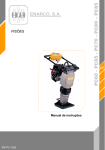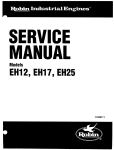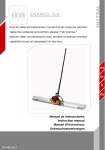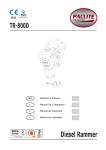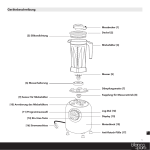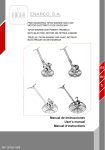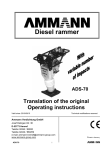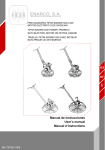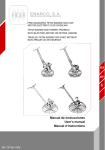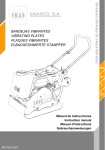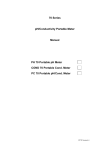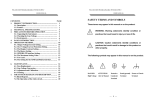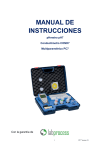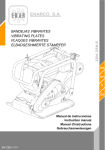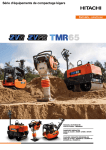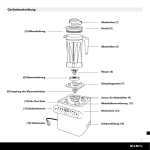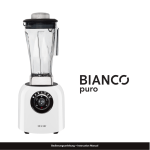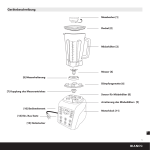Download ENARCO, S.A. P H 60 - P H 70
Transcript
PISONES PH60 - PH70 - PH80 ENARCO, S.A. es Manual de instrucciones HOJA EN BLANCO ÍNDICE 1 PRÓLOGO 2 2 INFORMACIÓN DE SEGURIDAD 3 2.1 SEGURIDAD EN LA OPERACIÓN DE LA MÁQUINA 3 2.2 SEGURIDAD EN LA OPERACIÓN DEL MOTOR 3 2.3 SEGURIDAD EN EL SERVICIO 4 3 ¿QUÉ MÁQUINA ES LA MÁS ADECUADA PARA CADA TRABAJO? 4 4 MEDIDAS ACÚSTICAS Y VIBRATORIAS 5 5 PUESTA EN MARCHA, FUNCIONAMIENTO Y MANTENIMIENTO DE LA MÁQUINA 5 5.1 ANTES DE INICIAR EL TRABAJO 5 5.2 PUESTA EN MARCHA 5 5.3 TRABAJO 6 5.4 PARADA 6 6 7 5.5 SERVICIO DE MANTENIMIENTO Y ALMACENAMIENTO 7 5.6 LOCALIZACIÓN Y REPARACIÓN DE AVERÍAS 9 EN CASO DE AVERÍAS 12 6.1 INSTRUCCIONES PARA PEDIR REPUESTOS 12 6.2 INSTRUCCIONES PARA SOLICITAR GARANTÍAS 12 PLACAS E INDICATIVOS/PLATES AND INDICATIVES/PLAQUES ET INDICATEURS/PLATTEN UND KENNZEICHEN 8 es 13 ESPECIFICACIONES TÉCNICAS / TECHNICAL DATA / SPECIFICATIONS TECHNIQUES / TECHNISCHE DATEN 14 PISONES PH60 - PH70- PH80 1 1 PRÓLOGO Agradecemos la confianza depositada en la marca ENAR. La lectura del presente manual es importante para el completo conocimiento de las características y operaciones de trabajo de la bandeja compactadora. Antes de comenzar a trabajar con esta máquina o de realizar operaciones de mantenimiento en ella lea, comprenda y cumpla las instrucciones de seguridad de este manual. En caso de pérdida de este manual o de necesitar un ejemplar adicional solicítelo a ENARCO o acceda a él en formato electrónico en la página web de ENARCO: http://www.enar.es e imprímalo. Los procedimientos correctos de mantenimiento aseguran la larga duración y un excelente trabajo de la unidad. Aunque el presente manual da algunas indicaciones acerca del motor, recomendamos la consulta del manual de instrucciones del motor, en lo que al mantenimiento y reparaciones del motor se refiere. es 2 Si necesita información acerca de la operación o mantenimiento de esta máquina póngase en contacto con el servicio de asistencia de ENARCO llamando por teléfono, enviando un fax, realizando una consulta por correo electrónico a [email protected] o a través de la página web en el apartado Servicio ENAR. PISONES PH60 - PH70 - PH80 2 INFORMACIÓN DE SEGURIDAD 2.1 SEGURIDAD EN LA OPERACIÓN DE LA MÁQUINA El uso o mantenimiento incorrectos del equipo pueden generar situaciones de peligro. Lea y asimile las instrucciones de este apartado antes de empezar a trabajar con esta máquina. El operador del equipo debe responsabilizarse de que sabe trabajar con seguridad el equipo. Si tiene dudas solicite instrucción a personal conocedor de la máquina o contacte con ENARCO. ! • El motor se calienta mucho durante su funcionamiento, déjelo enfriar antes de tocarlo. • No deje nunca la máquina en marcha sin atención. • El operario debe usar ropa de protección y protecctores auditivos. • Impida el acceso al área de trabajo de personal no autorizado. • Asegurese de que sabe desconectar la máquina antes de poner el motor en marcha por si se encuentra en dificultades. • Pare la máquina antes de transportarla. • No intente levantar el equipo sin ayuda. Solicite ayuda o emplee un aparato de elevación usando el asa de izado integrada en la jaula de la bandeja. • No utilice el equipo si no se encuentra en buenas condiciones físicas. • Almacene el equipo de modo adecuado en un lugar limpio y seco cuando no lo vaya a usar. es 2.2 SEGURIDAD EN LA OPERACIÓN DEL MOTOR A causa de su alta inflamabilidad los combustibles son especialmente peligrosos. Su uso inadecuado puede graves daños personales y materiales. Cumpla SIEMPRE con las siguientes reglas de seguridad: ! • No haga funcionar el equipo dentro de un edificio o zonas cerradas de no existir un ventilación adecuada. En caso contrario puede sufrir intoxicación por monóxido de carbono con perdida de conocimiento, pudiendo llegar hasta la muerte. • Antes de rellenar el depósito de combustible, pare el motor y déjelo enfriar unos minutos. • No debe fumar durante el funcionamiento de la máquina, ni durante el repostaje. • No rellene el depósito cerca de una llama abierta y rellénelo en un área bien ventilada. • Sustituya inmediatamente el tanque de combustible si no es hermético, podría ser causa de explosiones. • Si durante el repostaje se derrama carburante empápelo en arena. Cámbiese de ropa si le cae combustible sobre ella. • Asegúrese de que el depósito de combustible está bien cerrado después de rellenarlo. • Compruebe que las tuberías y el depósito de combustible no tienen grietas ni fugas. PISONES PH60 - PH70- PH80 3 2.3 SEGURIDAD EN EL SERVICIO es 3 • No limpie ni revise el equipo estando en funcionamiento. • No arranque el motor con el cilindro inundado y habiendo retirado la bujía en los motores de gasolina. • No compruebe que la bujía da chispa si el cilindro está inundado de gasolina o hay vapores de gasolina. • No use disolventes o combustibles para limpiar el equipo, sobre todo en recintos cerrados. • Mantenga el área próxima al silenciador libre de materiales inflamables. • Antes de hacer operaciones de servicio en equipos con motor de gasolina remueva la bujía para evitar un arranque no previsto del motor. • No está permitido el uso del equipo en atmósferas explosivas. El tanque de combustible debe cerrar herméticamente. En transportes de largo recorrido es altamente recomendable vaciar de combustible el depósito del motor. ¿QUÉ MÁQUINA TRABAJO? MODELO APLICACIÓN Áreas de parcheo Fundación de edificios Caminos y paseos Canchas de tenis y deportes Preparación de base Soporte final de puentes o rampas Cruce de ferrocarriles Bloques de cemento entrelazados Construcción de redes Construcción de drenajes Compactación de zanjas. Reparación de huecos por rotura de tuberías, cables, etc. Alrededor de tuberías, cables, drenajes, etc. Relleno de rocas Grava Arena o material volcánico Suelos mixtos Fango Arcilla Espesor de capa 0 – 25 cm Espesor de capa 20 – 40 cm Mezcla caliente Mezcla fría Base - Capa de ligado 40 – 100 mm Capa de rodado 25 – 60 mm ES MÁS Placas reversibles # + # # + + + # + + + ADECUADA Placas reversibles # + + + # # no PARA CADA Pisones # # # + + + + # # + + + + + + + + # # + # + + # + # + + + + + # # + # Puede ser usado 4 LA + + + # + + Recomendado PISONES PH60 - PH70 - PH80 4 MEDIDAS ACÚSTICAS Y VIBRATORIAS - nivel de potencia acústica según ISO 3744: LWA ≈ 108 dB(A) - nivel de presión sonora según ISO 6081: LpA ≈ 96 dB(A) - valor efectivo ponderado de aceleración axial según ISO 5349: 6,4-7,8 m/s 5 2 PUESTA EN MARCHA, FUNCIONAMIENTO Y MANTENIMIENTO DE LA MÁQUINA 5.1 ANTES DE INICIAR EL TRABAJO 5.1.1. Los mecanismos de esta máquina se lubrican por baño de aceite. Compruebe el nivel de aceite por la mirilla que se encuentra en la parte posterior debajo del fuelle. Agregue aceite si no fuera posible ver aceite por la mirilla hasta que cubra la mitad de la mirilla. 5.1.2. Llene el tanque de combustible con el tipo de carburante adecuado al motor que equipa su máquina según la tabla. MODELO DE MOTOR HONDA GX120 HONDA GX100 ROBIN ER12 GASOLINA SIN PLOMO ROBIN EH12 YANMAR L48 es GAS-OIL A TIPO DE CARBURANTE Al llenar el tanque, esté seguro de filtrar el combustible con un colador. No se olvide de colocar el tapón de llenado y cerrarlo, puesto que el trabajo sin él es peligroso, debido a que se producen derrames de combustible por la vibración y podría llegar a inflamarse y arder. 5.1.3. Verifique la tensión de cada perno, tuerca o área roscada. Un tornillo flojo debido a la vibración puede ocasionar un problema serio inesperado. Asegúrese de apretar todas las áreas roscadas. 5.1.4. Elimine la suciedad y polvo. Limpie especialmente la zona adyacente al arrancador de retroceso y al pie. 5.2 PUESTA EN MARCHA 5.2.1. Abra la llave de combustible desplazando hacia abajo la palanca. Cierre la palanca del regulador de aire y ponga la palanca de la válvula de estrangulación del aire en la posición media abierta. Para poner en marcha el motor frío desplace la palanca del regulador de aire hasta la posición de cerrado. Cuando el motor está caliente, el regulador de aire debe estar abierto a medias o por completo. Si la puesta en marcha del motor resulta difícil, asegúrese de que la palanca del regulador de aire esté medio abierta para evitar que el carburador sea anegado por exceso de combustible. 5.2.2. Al tirar de la cuerda de arranque, no apure al máximo toda la longitud, puede dañar el muelle de recuperación. No suelte la cuerda de golpe para repetir la puesta en marcha una vez arrancado el motor, mantenga el tirador en la mano y ceda despacio hasta que se recoja totalmente. PISONES PH60 - PH70- PH80 5 5.3 es TRABAJO 5.3.1. Después de arrancar el motor, vuelva a abrir completamente de forma gradual la palanca del regulador de aire. Deje el motor calentarse en velocidad mínima durante 3-5 minutos. Este procedimiento de calentar el motor en mínimas revoluciones es particularmente importante durante la temporada fría. Mientras el motor se esté calentando haga una revisión general de la máquina, para detectar cualquier anomalía. 5.3.2. El pistón comienza a funcionar cuando se gira la palanca del acelerador desplazándola rápidamente hasta hacer tope. Si la palanca se desplaza lentamente la acción del pisón será irregular, y se dañará el embrague, EL RESORTE O LA PATA DEL MISMO. 5.3.3. Después de que comienza a funcionar, ajuste el movimiento de vibración de manera tal que se adecue a la condición particular del suelo, controlando levemente la palanca del acelerador. Este pisón ha sido diseñado en forma tal que, cuando el motor trabaje a una velocidad comprendida entre las 3.600 y 4.000 r.p.m., su pata golpea la superficie del suelo a razón de 600 a 700 veces por minuto, lo que brinda la mejor eficacia del trabajo. Un aumento innecesario de la velocidad del motor no ocasiona un aumento de la fuerza de compactación, al contrario, la resonancia resultante hace que la fuerza de compactación DISMINUYA, DAÑANDO LA MÁQUINA. 5.3.4. En tiempo frío, como el aceite que existe en la máquina es viscoso, la resistencia en la parte alternante es mayor, ocasionando un movimiento algo irregular del pisón compactador. Por lo tanto antes de comenzar el trabajo se recomienda hacer funcionar la máquina para calentarla mientras se desplaza la palanca del acelerador repetidas veces entre las posiciones 0 - ¼ de vuelta. 5.3.5. La superficie de la pata en contacto con el suelo se encuentra revestida con una placa metálica tratada térmicamente. Sin embargo, para compactar canto rodado es aconsejable un relleno de material fino, arena por ejemplo, en tal forma que el extremo posterior de la superficie plana de la pata se encuentre EN CONTACTO CON EL TERRENO. 5.3.6. El pisón compactador ha sido diseñado para que avance mientras vibra. Para lograr un avance más rápido levante la máquina tirando de la misma ligeramente hacia atrás, en forma tal que el extremo posterior de la superficie plana de la pata se encuentre EN CONTACTO CON EL TERRENO. 5.3.7. Para suspender el trabajo, e inversamente a la puesta en marcha, desplace rápidamente la palanca del acelerador de la posición ¼ a 0. 5.4 PARADA 5.4.1. 5.4.2. 5.4.3. 6 Para suspender el trabajo, e inversamente a la puesta en marcha, desplace rápidamente la palanca del acelerador de la posición ¼ a 0. Antes de parar el motor, déjelo al ralentí durante 2-3 minutos y luego oprima el botón de parada hasta que el motor se pare por completo. Cierre la llave de combustible poniendo la palanca en posición horizontal. PISONES PH60 - PH70 - PH80 5.5 SERVICIO DE MANTENIMIENTO Y ALMACENAMIENTO 5.5.1. Antes de realizar cualquier servicio de mantenimiento en el pisón compactador, PARE TOTALMENTE EL MOTOR 5.5.2. Servicio de mantenimiento diario: Elimine completamente de la máquina toda la suciedad, polvo ó aceite. Verifique el filtro del aire, limpiándolo según requiera. Apriete nuevamente los lugares donde se aprecie una fuga de aceite y verifique que todas las demás áreas se encuentren apretadas. 5.5.3. Servicio de mantenimiento semanal (cada 50 horas): Ajuste en la bujía la distancia entre electrodos a un valor igual a 0.7 – 0.8 mm. Retire el tapón de llenado de aceite (situado encima de la mirilla del nivel de aceite), coloque la máquina horizontal de manera que el orificio de llenado de aceite sirva para drenaje del aceite usado colocando la máquina con el orificio hacia abajo para drenar totalmente el aceite. Coloque la máquina de pie nuevamente y por el mismo orificio eche aceite nuevo mediante un envasador, hasta realizar el nivel por la mirilla. El primer cambio de aceite se realizará a las 50 horas de funcionamiento, a partir de la segunda vez cada 250 horas de trabajo. 5.5.4. Servicio de mantenimiento quincenal (cada 100 horas) o por indicación del sensor de mantenimiento del filtro de aire (si está presente): es 2ª ETAPA 1ª ETAPA 3ª ETAPA ETAPAS DE FILTRADO PISONES PH60 - PH70- PH80 7 1 2 3 4 es Suelte las grapas de sujeción (2) Retire la tapa del filtro de aire (1). Extraiga la segunda (3, esponja) y tercera etapas de filtrado (4, cartucho). Sacuda la tercera etapa y soplela a presión de adentro afuera. limpie la segunda etapa de filtrado con una solución limpiadora neutra. Después de secarla, aplique un combustible mixto de gasolina y aceite, y sacuda bien. A continuación, exprima ligeramente el elemento primario externo (esponja) y colóquelo sobre la tercera etapa para montarlo, monte el conjunto en la carcasa interior del filtro, coloque la carcasa superior y cierre con las grapas de sujeción. 5.5.5. Servicio de mantenimiento mensual (Cada 250 horas): Limpie cuidadosamente cada parte de la máquina y apriete nuevamente los pernos y las tuercas según se requiera. 5.5.6. Almacenamiento correcto: Para un almacenamiento prolongado después de que se ha completado un trabajo, drene completamente el combustible del interior del tanque, del tubo de combustible y del carburador. Retire la bujía de encendido, vierta unas gotas de aceite en el cilindro y manualmente haga que el motor dé unas cuantas vueltas, de manera tal que el aceite alcance todos los puntos. Con respecto al exterior, límpielo con un paño humedecido en aceite. Almacene la máquina cubriéndola con una funda, en un lugar libre de humedad y polvo y evitando los rayos directos del sol. 5.5.7. Mantenimiento con sensor del filtro de aire Si dispone del sensor de carga del filtro de aire, conforme éste se vaya ensuciando el cuerpo amarillo se irá desplazando hasta llegar a la zona roja de indicación de necesidad de servicio. Proceda a realizar mantenimiento del filtro según lo indicado en el punto 5.5.4; rearme el sensor presionando el pulsador amarillo del filtro. 8 PISONES PH60 - PH70 - PH80 5.5.8. Funcionamiento del tacómetro. Con el motor parado la pantalla muestra el tiempo total de funcionamiento, este tiempo no puede ser puesto a cero. Con el motor en marcha la pantalla muestra las revoluciones por minuto. Para ver el tiempo de funcionamiento parcial pulsar el botón “SELECT”. Para la puesto a cero del tiempo parcial mantener pulsado el botón “SELECT”, se mostrará el tiempo parcial actual; al soltar el contador se pondrá a cero. Con motor diesel: Alarma de servicio SVC2: después de 50 horas de trabajo el tacómetro mostrará la alarma SVC2. Realice el mantenimiento prescrito. Para reiniciar el contador pulsar “RESET” tres veces y mantener pulsado hasta que aparezca RESET en la pantalla. Alarma de servicio SVC: después de 250 horas de trabajo el tacómetro mostrará la alarma SVC. Realice el mantenimiento prescrito. Para reiniciar el contador pulsar “RESET” dos veces y mantener pulsado hasta que aparezca RESET en la pantalla. 5.6 LOCALIZACIÓN Y REPARACIÓN DE AVERÍAS MOTOR DE GASOLINA No arranca: - Existe chispa pero la bujía no da chispa Existe electricidad en el cable de alta tensión - Bujía de encendido puenteada - Depósito de carbón en la bujía de encendido - Cortocircuito debido a una aislación deficiente de la bujía de encendido - Separación incorrecta entre electrodos No existe electricidad en el cable de alta tensión - Interruptor del botón de paro en cortocircuito - Bobina de encendido defectuosa - Aislamiento del condensador deficiente ó en cortocircuito - Bobina de encendido rota ó en cortocircuito Compresión satisfactoria - Combustible incorrecto - Ha entrado agua ó polvo - Filtro de aire deficiente - Existe combustible y la bujía de encendido da chispa es Compresión deficiente - Válvula de admisión o escape pegada ó defectuosa - Aro del pistón ó cilindro gastado - Culata del cilindro ó bujía de encendido ajustada incorrectamente - Junta de culata o junta de la bujía de encendido defectuosa El embrague está bloqueado haciendo que el vibrador gire al intentar arrancar No existe combustible en el carburador - Tanque de combustible vacío - La llave de combustible no está correctamente abierta - Filtro de combustible obturado - Orificio de ventilación de aire de la tapa del tanque obturado - Aire retenido en el tubo - Aguja de entrada del carburador pegada PISONES PH60 - PH70- PH80 9 Potencia Nula: - Potencia insuficiente • Compresión normal y no se observa fallo del encendido • Compresión insuficiente • Filtro de aire deficiente Depósito de carbón en el cilindro Nivel de combustible en el carburador incorrecto (Vea “Compresión deficiente” más arriba) La compresión es correcta pero el encendido es defectuoso Existe agua en el combustible La bujía de encendido está sucia Bobina de encendido defectuosa La bobina de encendido se cortocircuita a menudo • Vibrador lleno con exceso de aceite - Motor recalentado es • Depósito de carbón en la cámara de combustible o en la lumbrera de escape • Poder calorífico de la bujía de encendido incorrecto • Aletas de enfriamiento sucias - La velocidad de rotación fluctúa • Ajuste del regulador incorrecto • Resorte del regulador incorrecto • Flujo de combustible deficiente • Entra aire en el sistema de tubo de succión Función del arrancador de retroceso deficiente - Parte rotativa pegada con polvo - Fallo del resorte helicoidal MOTOR DIESEL (enfriado por aire) Arranque deficiente: A.- Compresión deficiente • Compresión nula • Válvula de succión ó escape defectuosa Ajuste del sistema de descompresión incorrecto Apenas existe compresión o es muy baja Contacto del asiento de la válvula deficiente Aro del pistón desgastado Cilindro gastado Superficie de ajuste del cilindro y de la culata del cilindro defectuosas Asiento del inyector flojo B.- No existe una inyección correcta de combustible en la cámara de combustión • Flujo de combustible insuficiente ó nulo • No existe inyección de combustible en la cámara de combustión 10 Orificio de ventilación de aire en la tapa del tanque obturado Paso del filtro de combustible obturado y tamiz del filtro obturado Llave del filtro de combustible cerrada Aire retenido en el tubo (especialmente cuando el tanque está vacío) Cilindro de la bomba de inyección ó émbolo pegado Inyector obturado Aguja del inyector pegada PISONES PH60 - PH70 - PH80 • Tanque de combustible vacío • Entró agua o polvo C.- Sistema de combustible y compresión, etc., normales, sin embargo no arranca • No alcanzan la velocidad de arranque Procedimiento de arranque incorrecto Viscosidad alta o contaminación excesiva del aceite del motor Aire retenido en el tubo Potencia de salida insuficiente. Compresión deficiente: • Motor recalentado y escape sucio • La velocidad fluctúa • Se está utilizando aceite defectuoso Se descuida el reemplazo del aceite Elemento del filtro de aire defectuoso o sucio Engrane o daño del pistón o de la varilla Aceite lubricante diluido, aumentando su volumen • Fuga en la tubería de combustible Elemento de filtro de aire obturado Combustible defectuoso debido a que contiene impurezas Sobrecarga Se detiene súbitamente con un ruido anormal • Pistón, Cilindro, Aro gastado Inyector obturado Aro del pistón superior e inferior instalados al revés Regulación del avance de la inyección incorrecta Sincronización de la válvula incorrecta Junta de la bomba de inyección floja Junta de la bomba de inyección floja Parte deslizante excesivamente gastada o aro del pistón pegado • es Consumo de combustible alto (Se observa escape oscuro) • Sincronizado de la válvula incorrecta Lumbrera de escape o silenciador obturado Sobrecarga Encendido defectuoso acompañado por escape blanco • Contacto incorrecto entre la horquilla del regulador y el manguito Resorte del regulador incorrecto Placa de balancín y otras partes deslizantes desgastadas o funcionamiento defectuoso La velocidad del motor no aumenta correctamente • Aletas de enfriamiento sucias Agua en el filtro de combustible Depósito de carbón en la cámara de combustión en la lumbrera de escape Ajuste de humo incorrecto Sobrecarga Regulación del avance de la inyección incorrecta Inyector obturado Cuerpo del émbolo de bomba de inyección gastado El motor no se detiene, aun cuando se interrumpe el suministro de combustible (o causa una sobremarcha) Aceite excesivo Instalación del sistema del regulador incorrecta Bastidor de la bomba de inyección desplazado PISONES PH60 - PH70- PH80 11 OPERACIÓN DE LA MÁQUINA Velocidad de transición lenta y vibración débil. Se traslada oblicuamente • El regulador no (vea la página 10) • • Potencia del motor insuficiente El embrague patina • Aceite del vibrador excesivo se abre a la velocidad correcta del motor • Partes internas del vibrador defectuosas Avanza o retrocede, pero no se puede cambiar • • Ajuste incorrecto del cable de avance o marcha atrás Engranaje del vibrador • Partes del selector del sentido de traslación defectuosas • Ajuste incorrecto de la palanca del embrague No avanza ni retrocede es 6 • El embrague patina • Vibrador trabado • Si vibra pero no se traslada, el vibrador puede encontrarse en una superficie húmeda y deslizante. Pruebe en la superficie correcta EN CASO DE AVERÍAS 6.1 INSTRUCCIONES PARA PEDIR REPUESTOS 1.- En todos los pedidos de repuestos DEBE INCLUIRSE EL CÓDIGO DE LA PIEZA SEGÚN LA LISTA DE PIEZAS. Es recomendable incluir el NÚMERO DE FABRICACIÓN DE LA MÁQUINA. 2.- La placa de identificación con los números de serie y modelo se encuentran en la parte superior de la base motor. 3.- Provéanos con las instrucciones de transporte correctas, incluyendo la ruta preferida, la dirección y nombre completo del consignatario. 4.- No devuelva repuestos a fábrica a menos que tenga permiso por escrito de la misma, todas las devoluciones autorizadas deben enviarse a portes pagados. 6.2 INSTRUCCIONES PARA SOLICITAR GARANTÍAS 1.- La garantía tiene validez por 1 año a partir de la compra de la máquina. La garantía cubrirá las piezas con defecto de fabricación. En ningún caso la garantía cubrirá una avería por mal uso del equipo. 2.- En todas las solicitudes de garantía DEBE ENVIARSE LA MÁQUINA A ENARCO, S.A. O TALLER AUTORIZADO, indicando siempre la dirección y nombre completo del consignatario. 3.- El departamento de S.A.T. notificará si se acepta la garantía y en el caso de que se solicite se enviará un informe técnico. 4.- No tendrá ningún tipo de garantía cualquier equipo que haya sido previamente manipulado por personal no vinculado a ENARCO, S.A. NOTA: ENARCO, S.A. se reserva el derecho a modificar cualquier dato de este manual sin previo aviso 12 PISONES PH60 - PH70 - PH80 7 PLACAS E INDICATIVOS/PLATES AND INDICATIVES/PLAQUES ET INDICATEURS/PLATTEN UND KENNZEICHEN L WA PHX0H 00000000 ENARCO, S.A. C/ Burtina, 16 50197 Zaragoza (SPAIN) 2012 es 6 Nº REF. 1 107228 2 107402 3 107284 4 RC6506 5 6 107225 DESCRIPCION ADHESIVO PROTECCION SEGURIDAD DESCRIPTION SAFETY PROTECTION STICKER ADHESIVO 104 Dba 104 dBA STICKER ADHESIVO TUMBADO DERECHO ANAGRAMA ENAR ADHESIVO CARÁCTERÍSTICAS ADHESIVO PRECAUCION MUELLES DESIGNATION ADHÉSIF PROTECTEUR SÉCURITÉ ADHESIF 104 Dba BENENNUNG SCHUTZKLEBSTOFF 104 dBA KLEBSTOFF PLACE RIGHT SIDE STICKER ADHÉSIF TOMBÉ À DROIT RECHTGELIEGENER KLEBSTOFF ENAR STICKER CHARACTERISTICS STICKER STICKER PRECAUTION SPRINGS AUTOCOLANT ENAR AUTOCOLANT CARACTÉRISTIQUES ADHÉSIF PRECAUTION RESSORTS ENAR KLEBSTOFF MERKMALE KLEBSTOFF KLEBSTOFF ACHTUNG SPRUNGFEDER PISONES PH60 - PH70- PH80 13 8 ESPECIFICACIONES TÉCNICAS / TECHNICAL DATA / SPECIFICATIONS TECHNIQUES / TECHNISCHE DATEN 772 368 953 1038 es 332 14 280 PISONES PH60 - PH70 - PH80 COMBUSTIBLE (L) FUEL (L) COMBUSTIBLE (L) BRENNSTOFF (L) ACEITE MOTOR (L) ENGINE OIL (L) HUILE MOTEUR (L) MOTORENÖL (L) POTENCIA NOMINAL NOMINAL POWER PUISSANCE NOMINALE NENNLEISTUNG BUJÍA SPARK PLUG BOUGIE ZÜNDKERZE ENTREHIERRO GAP ENTREFER LUFTSPALT R.P.M. R.P.M. TR-MN U-MN RALENTÍ IDLING RÉGIME RALENTI LEERLAUFDREHZAHL HONDA GX100 DKR ROBIN ER12 HONDA GX120 DKR ROBIN EH12 D YANMAR L48 AE SIN PLOMO (2.7) SIN PLOMO (2.7) SIN PLOMO (2,7) SIN PLOMO (2,7) GAS-OIL (2,7) SAE 10W/40 (0,6) SAE 10W/40 (0,4) SAE 10W/40 (0,3) SAE 10W/40 (0,4) SAE 10W/40 (0,8) 3 kW (4 HP) 3 kW (4 HP) 3 kW (4 HP) 2,6 kW (3,5 HP) 3,1 kW (4,1 HP) NGK CR5HSB DENSO U16FSR-UB NGK CR5HSB DENSO U16FSR-UB NGK BP4ES DENSO W14EP-U NGK B6ES CHAMPION N4C ---- 0,6 mm - 0,7 mm 0,6 mm - 0,7 mm 0,7 mm - 0,8 mm 0,6 mm – 0,7 mm ---- 4000 rpm ± 50 4000 rpm ± 50 3500 rpm ± 50 3600 rpm ± 50 3600 rpm ± 50 1700 ±150 r.p.m. 1700 ±150 r.p.m. 1500 ±150 r.p.m. 1600 ±150 r.p.m. 1500 ±150 r.p.m. ESPECIFICACIONES PESO SIN COMBUSTIBLE (Kg) WEIGHT WITHOUT COMBUSTIBLE (Kg) POIDS SANS COMBUSTIBLE (Kg) GEWICHT (Kg) ELEVACIÓN DEL PISÓN (mm) IMPACT COURSE HEIGHT (mm) PARCOURS DE FRAPPE (mm) SPRINGWEG (mm) NUMERO DE GOLPES POR MINUTO NUMBER OF BLOWS BY MINUTE FREQUENCE D’IMPACTS PAR MINUTE EINSCHLAGSFREQUENZ MOTOR ENGINE MOTEUR MOTOR LUBRICANTE MÁQUINA (L) MACHINE OIL (L) HUILE POUR MACHINE (L) MASCHINENOEL (L) PH60H PH60R PH70H PH70R PH80YD 68 68 72 72 80 60 65 70 70 70 700 700 700 700 700 HONDA GX100U ROBIN ER12 ROBIN GX120U ROBIN EH12D YANMAR L48AE es SAE 30 / ISO 100 (1.8 L.) PISONES PH60 - PH70- PH80 15 TAMAÑO DE LLAVE SPANNER SIZE DIMENSION DE LA CLEF GRÖSSE VON DEM SCHRAUBERSCHLÜSSEL PAR DE APRIETE TORQUE COUPLE DREHMOMENT 8.8 MÉTRICA es Ft.Lb. Nm Ft.Lb. Nm Ft.Lb. Nm mm mm M4 *26 2.9 *36 4.1 *43 4.9 7 3 M5 *53 6.0 6 8.5 7 10 8 4 M6 7 10 10 14 13 17 10 5 M8 18 25 26 35 30 41 13 6 M10 36 49 51 69 61 83 17 8 M12 63 86 88 120 107 145 19 10 M14 99 135 140 190 169 230 22 12 M16 155 210 217 295 262 355 24 * = In.Lb. TIPO TYPE TYPE TYP 1 Ft.Lb. = 1.357 Nm COLOR COLOR COLEUR FARBE Morado Loctite 222 Hernon 420 Omnifit 1150 (50M) Purple Violette Dunkelviolett Azul Loctite 243 Hernon 423 Omnifit 1350 (100M) Blue Bleue Blau Blanco Loctite 592 Hernon 920 Omnifit 790 White Blanque Weis Transparente Loctite 495 Clear Transparente Deurchsichtig Verde Loctite 601 Green Verte Grün 16 12.9 10.9 USO USE USAGE GEBRAUCH Resistencia baja, para fijar roscas menores a M36.Resiste desde -54º a 149ºC. Low strength, for locking threads smaller than M36.Temp. Range –54º to 149ºC. Peu de resistence pour fixer des filets plus petits que la M36. Elle resiste de –54º jusqu’à 149ºC. Niedrieger widerstandskraft, um Gewinde kleiner als M36 zu befestigen. Das widersteht von –54º bis 149ºC. Resistencia media, para fijar roscas mayores a M36.Resiste desde -54º a 149º C. Medium strength, for locking threads larger than M36.Temp. Range –54º to 149ºC Resistence moyenne pour fixer des filets jusqu’â M36. Elle resiste de –54º jusqu’â 149ºC. Medium widerstandskraft, um grösser als M36 Gewinde zu befestigen. Das widersteht von 54º bis 149ºC. 14 1 Inch = 25.4 mm Nº PIEZA/TAMAÑO PARTNUMBER/SIZE Nº PIÈCE/DIMENSION TEILNUMMER/GRÄSSE 124151 – 10 ml 124152 – 0.5 ml 124155 – 50ml Sellador de tuberías con Teflón. Resiste desde -54º a 149º C. Pipe sealant with Teflon. Temp. Range –54º to 149º C. Colle de tuyanterie avec teflon. Elle resiste de –54º jusqu’à 149ºC. Klebstoff mit teflon für Rohrleitungen. Das widerstehr von –54º bis 149ºC. 6 ml 50 ml Adhesivo estructural para metal. Resiste desde -54º a 82º C. Instant adhesive for metal. Temp. Range –54º to 82º C. Colle instantanée pour metal. Elle resiste de –54º jusqu’à 149ºC 124156 – 1 oz. Sofortiger klebstoff für metal. Das widersteht von –54º bis 82ºC Producto anaeróbico de retención de alta resistencia, tolerante al aceite. High resistant product, wich doesn´t need air to react and bears the oil. Producte anaérobie de rétention d’haute resistence, tolérant au huile. Stoff von grösser widerstandskraft, der ohne sauerstoff reagiert und das öl zulässt. 124154 – 6 oz. PISONES PH60 - PH70 - PH80 ENARCO, S.A. PARA REALIZAR CUALQUIER CONSULTA SOBRE LOS DESPIECES Y LISTAS DE PIEZAS DE NUESTRAS MÁQUINAS CONSULTE NUESTRA PÁGINA WEB. Web: https://www.enar.es/ es ENARCO, S.A. ENARCO, S.A. C/ Burtina, 16 50197 ZARAGOZA SPAIN Tfno. (34) 976 470 836 (34) 976 464 090 (34) 976 471 470 e-mail: [email protected] Web: http://www.enar.es TAMPING RAMMERS PH60 - PH70 - PH80 ENARCO, S.A. en Instruction manual HOJA EN BLANCO CONTENTS 1 PREFACE 2 2 SAFETY INFORMATION 3 2.1 SAFETY DURING THE OPERATION OF THE MACHINE 3 2.2 SAFETY DURING OPERATION OF THE ENGINE 3 2.3 SAFETY DURING SERVICE 4 3 WHICH MACHINE IS THE MOST SUITABLE FOR EACH APPLICATION? 4 4 SOUND AND VIBRATION MEASUREMENTS 5 5 STARTING, OPERATION AND MAINTENANCE OF THE MACHINERY 5 6 5.1 BEFORE STARTING WORK 5 5.2 STARTING UP THE MACHINE 5 5.3 OPERATING THE MACHINE 6 5.4 STOPPING THE MACHINE 6 5.5 MAINTENANCE SERVICE AND STORAGE 7 5.6 LOCALIZING AND REPAIRING FAULTS 9 IN CASE OF FAILURE en 12 6.1 INTRUCTIONS FOR ORDERING PARTS 12 6.2 INTRUCTIONS FOR REQUESTING GUARANTEES 12 7 PLACAS E INDICATIVOS/PLATES AND INDICATIVES/PLAQUES ET INDICATEURS/PLATTEN UND KENNZEICHEN 13 8 ESPECIFICACIONES TÉCNICAS / TECHNICAL DATA / SPECIFICATIONS TECHNIQUES / TECHNISCHE DATEN 14 TAMPING RAMMERS PH60, PH70, PH80 1 1 PREFACE We would like to thank our customers for the trust placed in the ENAR brand. It is important to read this manual to gain a full understanding of the characteristics and functions of the compactor. Before commencing work with this machine, or performing maintenance tasks on it, read, digest and observe all the safety instructions included in this manual. In the event of this manual becoming lost or a further copy required, this can be ordered from ENARCO or printed out direct from the ENARCO website: http://www.enar.es. Following the correct procedures for maintenance will guarantee the long life and excellent performance of this equipment. Although this manual provides certain specifications for the motor, we recommend consulting the instruction manual for the motor for information on maintenance and repairs. If information concerning the operation or maintenance of this machine is required, please contact the ENARCO customer service by telephone or fax, or by sending an email to [email protected] or through our website in the section entitled Servicio ENAR. . en 2 TAMPING RAMMERS PH60, PH70, PH80 2 SAFETY INFORMATION 2.1 SAFETY DURING THE OPERATION OF THE MACHINE Improper use or maintenance of the equipment may lead to hazardous situations. Read and digest the instructions in this section before starting work with this machine. Machine operators should ensure that they know how to work the equipment safely. All queries should be dealt with by personnel familiar with the machine or else by contacting ENARCO directly. ! • The motor gets very hot during operation: leave it to cool down before touching it. • Never leave the machine unattended during operation. • Operators should use protective clothing and ear muffs. • Close off entry to the worksite for all unauthorised personnel. • Make sure you know how to disconnect the machine before starting up the motor in case you get into difficulties. • Make sure the machine has stopped before any attempt is made to move it. • Do not attempt to lift the equipment unaided. Ask for help or use a lifting machine, taking hold of the equipment by the lifting handle incorporated in the assemblysurrounding the compaction plate. • Do not use the equipment if you are not in good physical shape. • Store the equipment properly in a clean, dry place whenever it is not going to be used. Fuels and other consumables should be kept in marked containers in accordance with the manufacturer’s instructions. All current legislation concerning the storage site should also be complied with. en 2.2 SAFETY DURING OPERATION OF THE ENGINE Owing to their high degree of inflammability, fuels are particularly dangerous. Improper use can cause serious damage to personnel and materials. Always observe the following safety regulations: ! • Do not operate the machine inside a building or closed area without adequate ventilation. Failure to comply with this regulation may lead to intoxication from carbon monoxide with loss of consciousness, and even death. • Before filling the fuel tank, stop the motor and leave it to cool down for a few minutes. • Smoking is prohibited while the machine is in operation, or being refueled. • Do not refill the tank near an open flame and remember to always refuel in an area that is well ventilated. • If the fuel tank is not airtight, it should be replaced immediately, since it could lead to explosions. • If any fuel is spilt while refueling, spread sand over the area. Change your clothes if any fuel is spilt on them. • Make sure that the fuel tank is closed properly after refueling. • Check that there are no cracks or leaks in the pipes or fuel tank. TAMPING RAMMERS PH60, PH70, PH80 3 2.3 SAFETY DURING SERVICE 3 en • Do not clean or inspect the equipment during operation. • Do not start the motor up with the cylinder flooded or if the spark plug in the petrol motors has been removed. • Do not inspect the igniter plug to see if it is sparking correctly if the cylinder is flooded with petrol or in the presence of any petrol fumes. • Do not use dissolvents or fuels to clean the equipment, particularly in closed spaces. • Maintain the area around the silencer clear of inflammable materials. • Before servicing petrol-driven machines, remove the spark plug to guard against the motor starting up accidentally. • It is not permitted to use the equipment in explosive environments. The fuel tank should be shut tight. When being transported over long distances, it is highly recommended that the fuel tank be emptied beforehand. • The transport accessory has not been designed for standing the compaction plate on it and should only be used to move the equipment. WHICH MACHINE APPLICATION? MODEL APPLICATION Patching areas Building foundations Paths and footways Tennis courts and sports areas Soil preparation Final support for bridge and ramps Railway junctions Interlocking cement blocks Construction of mains Construction of drainage Compaction of ditches. Reparation of damage caused by broken piping, cables, etc. Work around piping, cables, drainage, Filling with rocks Gravel Sand or volcanic material Mixed grounds Mud Clay Layer thickness 0 – 25 cm Layer thickness 20 – 40 cm Hot mortar Cold mortar Subgrade 40 – 100 mm Layer of boulders 25 – 60 mm # Can be used 4 IS THE MOST Reversible plates SUITABLE FOR EACH Non-reversible plates Tamping rammers # + + + # # # # # # + + + + + + + + # # + # + + # + # + + + + + # # + # + # # + + + # + + + # + + + + + + + # + + Recommended TAMPING RAMMERS PH60, PH70, PH80 4 SOUND AND VIBRATION MEASUREMENTS - Level of acoustic power according to ISO standard 3744: LWA ≈ 108 dB(A) - Level of acoustic pressure according to ISO standard 6081: LpA ≈ 96 dB(A) - Weighted real value of axial acceleration according to ISO 5349 Part 1: 5 - 10 m/s2 5 STARTING, MACHINERY OPERATION AND MAINTENANCE OF THE 5.1 BEFORE STARTING WORK 5.1.1. The mechanisms of this machine are lubricated by means of an oil bath. Check the oil level using the visor situated at the rear beneath the bellow. If oil cannot be seen through the visor, add oil until half the visor is covered. 5.1.2. Fill the fuel tank with the appropriate type of fuel for the engine your machine is provided with, according to the table below: ENGINE TYPE HONDA GX120 HONDA GX100 ROBIN ER12 UNLEAD PETROL ROBIN EH12 YANMAR L48 en GAS-OIL A TYPE OF FUEL When filling the tank, be sure to filter the fuel with a strainer. Do not forget to replace the fuelling cap and close it. Failure to do this is dangerous, as the vibration of the machine may cause spillages of fuel that then ignite and burn. 5.1.3 Be sure to check the tension of every bolt, nut or threaded area. A screw that has come loose due to vibration may unexpectedly cause a serious problem. Make sure that all screws are tightened. 5.1.4. Remove all dirt and dust. Pay special attention to cleaning the area adjacent to the starter and the leg. 5.2 STARTING UP THE MACHINE 5.2.1. Open the fuel tap by moving the air regulator lever downwards, and put the choke valve lever in the half-open position. To start the engine cold, move the air regulator lever to the closed position. When the engine is hot, the air regulator should be half-open or completely open. If it proves difficult to start the engine, make sure that the air regulator lever is half-open to prevent the carburettor from flooding due to excess fuel. 5.2.2. When pulling the starter rope, do not apply full pressure for the whole length, as this may damage the spring. Do not suddenly release the rope in order to repeat the process once the engine has started. Hold on to the rope, and slowly release until it has fully returned to position. TAMPING RAMMERS PH60, PH70, PH80 5 5.3 OPERATING THE MACHINE en 5.3.1. After starting the engine, gradually re-open the air regulator lever completely. Allow the engine to warm up at minimum velocity for a period of 3 to 5 minutes. This procedure of warming up the engine at a minimum revolution level is particularly important during the cold period. While the engine is warming up, carry out a general revision of the machine to make sure that there are no anomalies. 5.3.2. The piston starts to operate when the accelerator lever is turned with a rapid movement a quarter of a revolution. If the lever is moved slowly, the action of the rammer will be irregular, possibly causing damage to the clutch, the spring and the leg. 5.3.3. After the machine has started to operate, adjust the movement of the vibration in such a way that it conforms to the particular condition of the ground, using the accelerator lever slightly as a control. This rammer has been designed in such a manner that when the engine works at a velocity of between 3,600 and 4,000 r.p.m., its leg hits the surface of the ground at a rate of 600 to 700 times per minute, thus ensuring the greatest efficiency of performance. An unnecessary increase in the velocity of the engine does not produce any increase in the force of compaction. Instead, the resulting resonance causes a reduction in the compaction force, damaging the machine. 5.3.4. In cold weather, as the oil in the machine is viscous, the resistance in the alternating part is greater, producing a somewhat irregular movement in the compacting rammer. For this reason, it is recommended that the machine should be run for a while before starting work to warm it up, moving the accelerator lever repeatedly between the positions 0 and ¼ turn. 5.3.5. The surface of the leg in contact with the ground is covered with a thermally treated metallic plate. Nonetheless, for the compaction of boulder it is advisable to use a filling of fine material such as sand so that the rear end of the leg's plane surface makes contact with the ground. 5.3.6. The compacting rammer has been designed to advance as it vibrates. To speed up the rate of advance, raise the machine by pulling it slightly in a backwards direction, in such a way that the rear end of the leg's plane surface makes contact with the ground. 5.4 STOPPING THE MACHINE 5.4.1. To stop work rapidly shift the accelerator lever from position ¼ to 0, the inverse of the movement for starting the machine. 5.4.2. Before stopping the engine, leave it ticking over for two to three minutes and then press the stop button until the engine stops completely. 5.4.3. Close the fuel tap by putting the lever in a horizontal position. 6 TAMPING RAMMERS PH60, PH70, PH80 5.5 MAINTENANCE SERVICE AND STORAGE 5.5.1. Before undertaking any maintenance service on the compacting rammer, STOP THE ENGINE COMPLETELY. 5.5.2. Daily maintenance service: Remove all dirt, dust or oil entirely from the machine. Check the air filter, cleaning it as necessary. Tighten up any areas where oil has leaked, and make sure that all other areas are tightened as necessary. 5.5.3. Weekly maintenance service (every 50 hours): Remove the cap of the air filter and clean the internal element using a neutral cleansing solution. After drying, apply a fuel composed of a mixture of petrol and oil (if possible, utilize the fuel in use), and shake well. Then, gently squeeze the primary external element (sponge) and place it on the secondary internal element to cover it. In the sparking plug, adjust the distance between electrodes to a value of between 0.7 and 0.8 mm. Remove the oil cap (situated above the oil-level visor), and put the machine in a horizontal position in such a way that the oil hole serves to drain off the used oil, placing the machine with the hole downwards in order to drain the oil completely. Place the machine upright again, and use the same hole to pour in new oil, until the correct level can be seen in the visor. The first change of oil should be made after 50 hours in operation, from the second time onwards every 300 hours in operation. 5.5.4. Maintenance service fortnightly (100 hours) or with signal from air filter sensor (if it’s present): en 2ª STAGE 1ª STAGE 3ª STAGE FILTERING STAGES TAMPING RAMMERS PH60, PH70, PH80 7 en 1 2 3 4 Release the retaining clips (2) Remove the air filter cover (1). Remove the second (3, sponge) and third stages of filtration (4, cartridge). Shake the third stage and blow it from inside to outside. Clean the second stage filter with a neutral cleaning solution. After drying, apply a mix of gasoline and oil, and shake it vigorously. Then, lightly squeeze the external primary element (sponge) and mount it on the third stage, mount the assembly in the filter lower housing, place and close the upper housing with mounting clips. 5.5.5. Monthly maintenance service (every 300 hours): Clean the inside of the fuel tank. Carefully clean every part of the machine, and again make sure all the bolts and nuts are tightened up as necessary. 5.5.6. Correct storage: For a prolonged period of storage after a particular job has been terminated, completely drain the fuel from the interior of the tank, the fuel tube and the carburettor. Remove the sparking plug, pour a few drops of oil into the cylinder, and by hand get the engine to make a few revolutions in such a way that the oil reaches the whole area. As for the exterior, clean it with a cloth dampened with oil. To store the machine, keep it under cover in a location free from humidity and dust and out of direct sunlight. 5.5.7. Air filter sensor maintenance: If air filter sensor is present, as air filter dirties, the yellow body in sensor reaches the red zone indicating need for service. Do filter maintenance as indicated in point 5.5.4 and reset the sensor by pressing the yellow button. 8 TAMPING RAMMERS PH60, PH70, PH80 5.5.8. Tachometer operation. When the engine is shut off the display shows total run time, this time cannot be reset. When engine is started the display shows revolutions per minute. To view partial job time press "SELECT". To reset job time push and hold "SELECT" button until display shows “RESET” and hours accumulated on the current job, When you release the button the counter will reset to 0. With diesel engine: SVC2 service alarm: after 50 hours working the tachometer will show SVC2 alarm. Perform prescribed maintenance. To reset press "RESET" three times and hold RESET until display shows “RESET”. SVC Service alarm: After 250 hours tachometer will show alarm SVC. Perform prescribed maintenance. To reset press "RESET" twice and hold RESET until display shows “RESET”. 5.6 LOCALIZING AND REPAIRING FAULTS PETROL ENGINE Does not start: - There is fuel, but the sparking plug does not produce a spark • There is electricity in the high-tension cable Sparking plug flecked Carbon deposit in the sparking plug Short-circuit due to insufficient insulation of the sparking plug Incorrect separation between electrodes • There is no electricity in the high-tension cable Switch of detention button short-circuited Ignition coil defective Insulation of condenser deficient or short-circuited Ignition coil broken or short-circuited en Compression satisfactory Incorrect fuel Water or dust has entered Defective air filter - There is fuel, and the sparking plug does produce a spark • • Compression insufficient Inlet valve or exhaust valve stuck or defective Piston ring or cylinder worn out Cylinder head or sparking plug incorrectly fitted Cylinder head joint or sparking plug joint defective • The clutch is blocked, causing vibrator to rotate when attempt is made to start • There is no fuel in the carburettor Fuel tank is empty Fuel tap is not correctly open Fuel filter is blocked Air ventilation opening in tank lid is blocked Air retention in tube Inlet valve of carburettor is stuck TAMPING RAMMERS PH60, PH70, PH80 9 No power: - Insufficient power • Normal compression and no visible defect in ignition Air filter defective Carbon deposit in cylinder Incorrect fuel level in carburettor • Insufficient compression (See “Compression insufficient” above) • Compression is correct, but ignition is defective There is water in the fuel Sparking plug is dirty Ignition coil is defective Ignition coil keeps short-circuiting • Vibrator is full of excess oil - Engine overheated • Carbon deposit in fuel chamber or exhaust vent • Incorrect heat-producing capacity in sparking plug • Cooling fins are dirty - Rotation velocity fluctuates en • Regulator incorrectly set • Regulator spring faulty • Deficient fuel flow • Air entering tube suction system Starter functioning defectively - Rotating part clogged with dust - Helical spring faulty DIESEL ENGINE (AIR COOLED) Problems with starting: A.- Insufficient compression • No compression Suction valve or exhaust valve defective Decompression system incorrectly set • There is little or virtually no compression Contact of valve seating is defective Piston ring is eroded Cylinder is worn out Surface of cylinder fitting and cylinder head defective Seating of injector is loose B.- Fuel injection in the combustion chamber is not functioning properly • There is little or no flow of fuel Air ventilation opening in tank lid is blocked Pass of fuel filter is obstructed and the filter is blocked Tap of fuel filter is closed Air retention in tube (particularly when the tank is empty) 10 TAMPING RAMMERS PH60, PH70, PH80 • There is no fuel injection in the combustion chamber Cylinder of injection pump or piston is stuck Injector blocked Injector needle is stuck • Fuel tank is empty • Water or dust has entered C.- System of fuel and compression etc. as normal, yet nonetheless machine does not start • Starting velocity is not reached Incorrect starting procedure High viscosity or excessive contamination of the oil in the engine Air retention in tube Insufficient power output. Insufficient compression: • Engine overheated and exhaust dirty Cooling fins are dirty Water in fuel filter Carbon deposit in combustion chamber or exhaust vent Fume level incorrectly set Overloading Injection feed incorrectly set Injector blocked • There are fluctuations in velocity Faulty contact between regulator fork and sleeve Faulty regulator spring Plate of rocker arm and other sliding parts are worn out or functioning imperfectly • The engine does not increase its velocity as it should Incorrect valve synchronization Exhaust vent or silencer blocked Overloading en • Ignition defective accompanied by blank exhaust Piston, cylinder, ring worn out Injector blocked Upper and lower piston rings fitted the wrong way round Injection feed incorrectly set. Incorrect valve synchronization Injection pump joint is loose • High fuel consumption (exhaust appears dark) Leak in fuel piping Element of air filter is blocked Fuel defective due to impurities Overloading • Sliding part is excessively worn out, or piston ring is stuck Defective oil is being used Regular replacement of oil is being neglected Element of air filter is defective or dirty • Machine stops suddenly, making a strange noise Seize-up or damage of piston or connecting rod • Lubricating oil diluted, increasing its volume Body of injection pump piston is worn out • The engine does not stop even when the fuel supply is broken off (or it causes an overdrive) Excess oil Regulator system incorrectly installed Frame of injection pump is out of place TAMPING RAMMERS PH60, PH70, PH80 11 OPERATION OF THE MACHINE Transition velocity is slow and vibration weak. Movement of machine is askew. • • • • • The regulator does not open to the correct velocity of engine (see page 10) Insufficient power of engine Clutch slips Excess of oil on vibrator Internal parts of vibrator are defective Moves forwards or backwards, but cannot switch • • • • Incorrect fitting of advance or return cable Vibrator is jammed Parts of motion-direction selector are defective Clutch lever incorrectly fitted Neither moves forwards nor backwards • Clutch slips • Vibrator is jammed • If there is vibration but no movement, it could be that the vibrator is on a moist or slippery surface. Try on the appropriate surface. en 6 IN CASE OF FAILURE 6.1 INTRUCTIONS FOR ORDERING PARTS 1. 2. 3. 4. In all orders placed for parts, THE CODE NO. GIVEN IN THE LIST OF PARTS SHOULD BE INCLUDED FOR THE PART CONCERNED. It is advisable to include the MACHINE’S SERIAL NUMBER. The specifications plate with the serial numbers and MODEL are on the top of the engine plate. Please supply the correct instructions for transport, including the preferred route, address and complete name of the consignee. Do not return parts to the factory unless you have been given written permission to do so. All authorized items should be returned carriage paid. 6.2 INTRUCTIONS FOR REQUESTING GUARANTEES 1. 2. 3. 4. The guarantee is valid for one year from the date the machine was purchased. The guarantee covers the parts with manufacturing faults. o In no case will the guarantee cover a fault caused by improper use of the equipment. In all requests for guarantees, THE MACHINE SHOULD BE SENT TO ENARCO, S.A. OR AN AUTHORIZED WORKSHOP, always indicating the complete name and address of the consignee. The Technical Department (S.A.T.) will notify you f the guarantee has been accepted and, if requested, can also send out a technical report. No piece of equipment will be covered by guarantee if it has been manipulated previously by personnel not connected to ENARCO, S.A. NOTA: ENARCO, S.A., reserves the right to modify any part of this manual without prior notice. 12 TAMPING RAMMERS PH60, PH70, PH80 7 PLACAS E INDICATIVOS/PLATES AND INDICATIVES/PLAQUES ET INDICATEURS/PLATTEN UND KENNZEICHEN L WA PHX0H 00000000 ENARCO, S.A. C/ Burtina, 16 50197 Zaragoza (SPAIN) 2012 en 6 Nº REF. 1 107228 2 107402 3 107284 4 RC6506 5 6 107225 DESCRIPCION ADHESIVO PROTECCION SEGURIDAD ADHESIVO 104 Dba ADHESIVO TUMBADO DERECHO ANAGRAMA ENAR ADHESIVO CARÁCTERÍSTICAS ADHESIVO PRECAUCION MUELLES DESCRIPTION SAFETY PROTECTION STICKER 104 dBA STICKER DESIGNATION ADHÉSIF PROTECTEUR SÉCURITÉ ADHESIF 104 Dba BENENNUNG SCHUTZKLEBSTOFF 104 dBA KLEBSTOFF PLACE RIGHT SIDE STICKER ADHÉSIF TOMBÉ À DROIT RECHTGELIEGENER KLEBSTOFF ENAR STICKER CHARACTERISTICS STICKER STICKER PRECAUTION SPRINGS AUTOCOLANT ENAR AUTOCOLANT CARACTÉRISTIQUES ADHÉSIF PRECAUTION RESSORTS ENAR KLEBSTOFF MERKMALE KLEBSTOFF KLEBSTOFF ACHTUNG SPRUNGFEDER TAMPING RAMMERS PH60, PH70, PH80 13 8 ESPECIFICACIONES TÉCNICAS / TECHNICAL DATA / SPECIFICATIONS TECHNIQUES / TECHNISCHE DATEN 772 368 953 1038 en 332 14 280 TAMPING RAMMERS PH60, PH70, PH80 COMBUSTIBLE (L) FUEL (L) COMBUSTIBLE (L) BRENNSTOFF (L) ACEITE MOTOR (L) ENGINE OIL (L) HUILE MOTEUR (L) MOTORENÖL (L) POTENCIA NOMINAL NOMINAL POWER PUISSANCE NOMINALE NENNLEISTUNG BUJÍA SPARK PLUG BOUGIE ZÜNDKERZE ENTREHIERRO GAP ENTREFER LUFTSPALT R.P.M. R.P.M. TR-MN U-MN RALENTÍ IDLING RÉGIME RALENTI LEERLAUFDREHZAHL HONDA GX100 DKR ROBIN ER12 HONDA GX120 DKR ROBIN EH12 D YANMAR L48 AE SIN PLOMO (2.7) SIN PLOMO (2.7) SIN PLOMO (2,7) SIN PLOMO (2,7) GAS-OIL (2,7) SAE 10W/40 (0,6) SAE 10W/40 (0,4) SAE 10W/40 (0,3) SAE 10W/40 (0,4) SAE 10W/40 (0,8) 3 kW (4 HP) 3 kW (4 HP) 3 kW (4 HP) 2,6 kW (3,5 HP) 3,1 kW (4,1 HP) NGK CR5HSB DENSO U16FSR-UB NGK CR5HSB DENSO U16FSR-UB NGK BP4ES DENSO W14EP-U NGK B6ES CHAMPION N4C ---- 0,6 mm - 0,7 mm 0,6 mm - 0,7 mm 0,7 mm - 0,8 mm 0,6 mm – 0,7 mm ---- 4000 rpm ± 50 4000 rpm ± 50 3500 rpm ± 50 3600 rpm ± 50 3600 rpm ± 50 1700 ±150 r.p.m. 1700 ±150 r.p.m. 1500 ±150 r.p.m. 1600 ±150 r.p.m. 1500 ±150 r.p.m. ESPECIFICACIONES PESO SIN COMBUSTIBLE (Kg) WEIGHT WITHOUT COMBUSTIBLE (Kg) POIDS SANS COMBUSTIBLE (Kg) GEWICHT (Kg) ELEVACIÓN DEL PISÓN (mm) IMPACT COURSE HEIGHT (mm) PARCOURS DE FRAPPE (mm) SPRINGWEG (mm) NUMERO DE GOLPES POR MINUTO NUMBER OF BLOWS BY MINUTE FREQUENCE D’IMPACTS PAR MINUTE EINSCHLAGSFREQUENZ MOTOR ENGINE MOTEUR MOTOR LUBRICANTE MÁQUINA (L) MACHINE OIL (L) HUILE POUR MACHINE (L) MASCHINENOEL (L) PH60H PH60R PH70H PH70R PH80YD 68 68 72 72 80 60 65 70 70 70 700 700 700 700 700 HONDA GX100U ROBIN ER12 ROBIN GX120U ROBIN EH12D YANMAR L48AE en SAE 30 / ISO 100 (1.8 L.) TAMPING RAMMERS PH60, PH70, PH80 15 TAMAÑO DE LLAVE SPANNER SIZE DIMENSION DE LA CLEF GRÖSSE VON DEM SCHRAUBERSCHLÜSSEL PAR DE APRIETE TORQUE COUPLE DREHMOMENT 8.8 MÉTRICA Ft.Lb. Ft.Lb. Nm Ft.Lb. Nm mm mm M4 *26 2.9 *36 4.1 *43 4.9 7 3 *53 6.0 6 8.5 7 10 8 4 M6 7 10 10 14 13 17 10 5 M8 18 25 26 35 30 41 13 6 M10 36 49 51 69 61 83 17 8 M12 63 86 88 120 107 145 19 10 M14 99 135 140 190 169 230 22 12 M16 155 210 217 295 262 355 24 TIPO TYPE TYPE TYP 1 Ft.Lb. = 1.357 Nm COLOR COLOR COLEUR FARBE Morado Loctite 222 Hernon 420 Omnifit 1150 (50M) Purple Violette Dunkelviolett Azul Loctite 243 Hernon 423 Omnifit 1350 (100M) Blue Bleue Blau Blanco Loctite 592 Hernon 920 Omnifit 790 White Blanque Weis Transparente Loctite 495 Clear Transparente Deurchsichtig Verde Loctite 601 Green Verte Grün 16 Nm M5 * = In.Lb. en 12.9 10.9 USO USE USAGE GEBRAUCH Resistencia baja, para fijar roscas menores a M36.Resiste desde -54º a 149ºC. Low strength, for locking threads smaller than M36.Temp. Range –54º to 149ºC. Peu de resistence pour fixer des filets plus petits que la M36. Elle resiste de –54º jusqu’à 149ºC. Niedrieger widerstandskraft, um Gewinde kleiner als M36 zu befestigen. Das widersteht von –54º bis 149ºC. Resistencia media, para fijar roscas mayores a M36.Resiste desde -54º a 149º C. Medium strength, for locking threads larger than M36.Temp. Range –54º to 149ºC Resistence moyenne pour fixer des filets jusqu’â M36. Elle resiste de –54º jusqu’â 149ºC. Medium widerstandskraft, um grösser als M36 Gewinde zu befestigen. Das widersteht von 54º bis 149ºC. 14 1 Inch = 25.4 mm Nº PIEZA/TAMAÑO PARTNUMBER/SIZE Nº PIÈCE/DIMENSION TEILNUMMER/GRÄSSE 124151 – 10 ml 124152 – 0.5 ml 124155 – 50ml Sellador de tuberías con Teflón. Resiste desde -54º a 149º C. Pipe sealant with Teflon. Temp. Range –54º to 149º C. Colle de tuyanterie avec teflon. Elle resiste de –54º jusqu’à 149ºC. Klebstoff mit teflon für Rohrleitungen. Das widerstehr von –54º bis 149ºC. 6 ml 50 ml Adhesivo estructural para metal. Resiste desde -54º a 82º C. Instant adhesive for metal. Temp. Range –54º to 82º C. Colle instantanée pour metal. Elle resiste de –54º jusqu’à 149ºC 124156 – 1 oz. Sofortiger klebstoff für metal. Das widersteht von –54º bis 82ºC Producto anaeróbico de retención de alta resistencia, tolerante al aceite. High resistant product, wich doesn´t need air to react and bears the oil. Producte anaérobie de rétention d’haute resistence, tolérant au huile. Stoff von grösser widerstandskraft, der ohne sauerstoff reagiert und das öl zulässt. 124154 – 6 oz. TAMPING RAMMERS PH60, PH70, PH80 ENARCO, S.A. FOR ANY REQUIREMENT ABOUT THE PART LIST OF OUR MACHINES CONSULT OUR WEB PAGE. Web: https://www.enar.es/ en ENARCO, S.A. ENARCO, S.A. C/ Burtina, 16 50197 ZARAGOZA SPAIN Tfno. (34) 976 470 836 (34) 976 464 090 (34) 976 471 470 e-mail: [email protected] Web: http://www.enar.es PILONNEUSE PH60 - PH70 - PH80 ENARCO, S.A. fr Manuel d'instructions HOJA EN BLANCO INDEX 1 PREAMBULE 2 2 INFORMATIONS DE SÉCURITÉ 2.1 SÉCURITÉ DANS LA MANIPULATION DE LA MACHINE 2.2 SÉCURITÉ DANS LA MANIPULATION DU MOTEUR 2.3 SÉCURITÉ DANS LE SERVICE 3 3 3 4 3 QUELLE MACHINE POUR CHAQUE TRAVAIL? 4 4 MESURES ACOUSTIQUES ET VIBRATOIRES 5 5 MISE EN MARCHE, FONCTIONNEMENT ET ENTRETIEN DE LA MACHINE 5.1 AVANT DE COMMENCER LE TRAVAIL 5.2 MISE EN MARCHE 5.3 TRAVAIL: 5.4 ARRET: 5.5 TRAVAIL DE MAINTENANCE ET STOCKAGE 5.6 LOCALISATION ET REPARATION DES PANNES 5 5 5 6 6 7 9 6 EN CAS DE PANNE 6.1 INSTRUCTIONS POUR COMMANDER DES PIÈCES DE RECHANGE 6.2 INSTRUCTIONS POUR FAIRE VALOIR LA GARANTIE 12 12 12 fr 7 PLACAS E INDICATIVOS/PLATES AND INDICATIVES/PLAQUES ET INDICATEURS/PLATTEN UND KENNZEICHEN 13 8 ESPECIFICACIONES TÉCNICAS / TECHNICAL DATA / SPECIFICATIONS TECHNIQUES / TECHNISCHE DATEN PILONNEUSE PH60, PH70, PH80 14 1 1 PREAMBULE Nous vous remercions pour la confiance que vous manifestez pour la marque ENAR. La lecture du présent manuel est importante pour la complète connaissance des caractéristiques et des opérations de travail du plateau de compactage. Avant de commencer à travailler avec cette machine ou d’y réaliser des opérations d’entretien, lisez, comprenez et respectez les instructions de sécurité de ce manuel. En cas de perte de ce manuel ou si vous voulez un exemplaire supplémentaire, vous pouvez le demander à ENARCO ou le trouver sous format électronique sur la page web d’ENARCO: http://www.enar.es et l’imprimer. Les procédés corrects d’entretien garantissent une longue durée de vie et un excellent travail de l’unité. Même si ce manuel fournit quelques indications à propos du moteur, pour son entretien et ses réparations nous recommandons une consultation du manuel d’instructions du moteur. . Si vous avez besoin d’informations au sujet de la manipulation ou de l’entretien de cette machine, mettez-vous en contact avec le service d’assistance d’ENARCO en appelant par téléphone, en envoyant un fax ou en réalisant une consultation par courrier électronique à [email protected] ou à travers la page web dans la section Service ENAR. fr 2 PILONNEUSE PH60, PH70, PH80 2 INFORMATIONS DE SÉCURITÉ 2.1 SÉCURITÉ DANS LA MANIPULATION DE LA MACHINE Une utilisation ou un entretien incorrects du matériel peuvent entraîner des situations de danger. Lisez et assimilez les instructions de cette section avant de commencer à travailler avec cette machine. L’opérateur du matériel doit être responsable et doit savoir travailler en respectant les conditions de sécurité du matériel. Si vous avez des doutes, demandez des informations à des personnes connaissant parfaitement la machine ou mettez-vous en contact avec ENARCO. ! • Le moteur chauffe beaucoup pendant son fonctionnement, laissez-le refroidir avant de le toucher. • Ne laissez jamais la machine en marche sans surveillance. • L’ouvrier doit utiliser des vêtements de protection et des protecteurs auditifs. • Interdisez l’accès à la zone de travail aux personnes non autorisées. • Vérifiez que vous savez déconnecter la machine avant de mettre en marche le moteur au cas où vous rencontreriez des difficultés. • Arrêtez la machine avant de la transporter. • N’essayez pas de soulever le matériel sans aide. Demandez de l'aide ou servezvous d’un appareil de levage en utilisant le levier intégré à la caisse du plateau. • N’utilisez pas le matériel si vous n’êtes pas en bonne condition physique. • Emmagasinez le matériel adéquatement dans un lieu propre et sec . 2.2 SÉCURITÉ DANS LA MANIPULATION DU MOTEUR fr À cause de sa haute inflammabilité, les combustibles sont particulièrement dangereux. Leur usage inapproprié peut provoquer de graves dégâts personnels et matériels. Respectez toujours les règles de sécurité suivantes: ! • Ne faites pas fonctionner le matériel à l’intérieur d’un bâtiment ou dans des zones fermées sans une aération adécuate. Dans le cas contraire, vous pouvez être victime d’une intoxication au monoxyde de carbone avec perte de connaissance, pouvant aller même jusqu’à la mort. • Avant de remplir le réservoir de combustible, arrêtez le moteur et laissez-le refroidir quelques minutes. • Vous ne devez pas fumer pendant le fonctionnement de la machine, ni pendant le ravitaillement en carburant. • Ne remplissez pas le réservoir près d’une flamme ouverte et remplissez-le dans une zone bien aérée. • Si, pendant le ravitaillement, du carburant est déversé, absorbez-le avec du sable. Changez-vous si vous renversez du carburant sur vos vêtements. • Assurez-vous que le réservoir de combustible est bien fermé après l’avoir rempli. • Vérifiez que la tuyauterie et le réservoir de combustible n’ont ni fissures ni fuites. PILONNEUSE PH60, PH70, PH80 3 2.3 SÉCURITÉ DANS LE SERVICE 3 fr • Ne nettoyez pas et ne révisez pas le matériel pendant son fonctionnement. • Ne faites pas démarrer le moteur avec le cylindre inondé ou en ayant retiré la bougie des moteurs d’essence. • Ne vérifiez pas que la bougie fait des étincelles si le cylindre est inondé d’essence ou s’il y a des vapeurs d’essence. • N’utilisez pas de dissolvants ou de combustibles pour nettoyer le matériel, surtout dans des lieux fermés. • Maintenez le silencieux dans un périmètre de sécurité loin de matériaux inflammables. • Avant de faire des opérations de service sur des équipements avec un moteur à essence, déplacez la bougie pour éviter un démarrage imprévu du moteur. • Il n’est pas permis d’utiliser le matériel dans des atmosphères explosives. Le réservoir de combustible doit fermer hermétiquement. Dans des transports de longue distance il est vivement recommandé de vider de combustible le réservoir du moteur. • L’accessoire de transport n’a pas été conçu pour qu’on y garde le plateau, utilisez-le seulement pour déplacer la machine. QUELLE MACHINE POUR CHAQUE TRAVAIL? MODELE APLICCATION Zones de retouches Fondations Chemins et allées Terrains de sport Préparation de base Support final ponts et rampes Intersection de chemin de fer Blocs de ciment Construction de routes Construction de drains Compactage de tranchées Réparation de trous (canalisations.. Contour des canalisations, cables Remplissage de gravas Gravier Sable ou matériau volcanique Sols mixtes Boue Argile Couche d'une épaisseur de 0-25 cm Couche d'une épaisseur de 20-40 cm Mélange chaud Mélange froid Base de mélange 40-100 mm Couche d'enrobé 25-60 mm Plaques reversibles # + # # + + + # + + + # # Marche avant Pilonneusos # + + + # # # # # + + + + + + + # # + # + + # + + + # + # Peut être utilise 4 + + + + + + # + + + + + # # + + Recommandé PILONNEUSE PH60, PH70, PH80 4 MESURES ACOUSTIQUES ET VIBRATOIRES - Niveau de puissance acoustique selon ISO 3744: LWA ≈ 108 dB(A) - Niveau de pression sonore selon ISO 6081: LpA ≈ 96 dB(A) - Valeur effective pondérée d’accélération axiale selon ISO 5349: 6,4-7,8 m/s2 5 MISE EN MARCHE, FONCTIONNEMENT ET ENTRETIEN DE LA MACHINE 5.1 AVANT DE COMMENCER LE TRAVAIL 5.1.1. Les mécanismes de cette machine se lubrifient par bain d’huile. Vérifiez le niveau d’huile à travers le voyant qui se trouve sur la partie postérieure en dessous du soufflet. Ajoutez de l’huile s’il n’était pas possible de voir l’huile par le voyant jusqu’à ce qu’elle couvre la moitié du voyant. 5.1.2. Remplissez le réservoir de combustble avec le type de carburant adapté au moteur qui équipe votre machine selon le tableau. MODELE DE MOTEUR HONDA GX120 HONDA GX100 ROBIN ER12 ESSENCE SANS PLOMB ROBIN EH12 YANMAR L48 GAS-OIL A TYPE DE CARBURANT Utilisez un carburant de haute qualité qui soit spécial pour des moteurs deux temps, ou sinon bien mélanger l’essence avec de l’huile de synthèse spéciale prévue à cet effet dans une proportion de 50:1. Quand vous remplissez le réservoir, assurez-vous de filtrer le combustible avec une passoire. N’oubliez pas de mettre le bouchon de remplissage et de le fermer, étant donné que sans lui le travail est dangereux, parce que des projections de combustible dues aux secousses pourraient se produire et par conséquent pourraient arriver à s’enflammer et à brûler. 5.1.3. Vérifiez le serrage de chaque boulon, écrou ou zones de serrage. Un vis desserré par les secousses peut entraîner un sérieux problème inattendu. Soyez sûr d’avoir serrer toutes les zones de serrage. 5.1.4. Eliminez la saleté et la poussière. Nettoyez spécialement la zone à côté du démarreur de recul et du pied. fr 5.2 MISE EN MARCHE 5.2.1. Ouvrez le robinet de carburant en déplaçant le levier vers le bas. Fermez le levier du régulateur d’air et mettez le levier de la soupape d’étranglement d’air sur la position semi-ouverte. Pour mettre en marche le moteur à froid déplacer le levier du régulateur d’air jusqu’à la position de fermeture. Quand le moteur est chaud, le régulateur d’air doit être ouvert à moitié ou complètement. Si la mise en marche du moteur est difficile, assurez-vous que le levier du régulateur d’air est à moitié ouvert pour éviter que le carburateur soit noyé par excès de combustible. 5.2.2. Quand vous tirez la corde de démarrage, ne la tirez pas au maximum de sa longueur, cela peut endommager le ressort de rappel. Ne lâchez pas la corde d’un coup pour remettre en marche une fois le moteur démarré, maintenez la poignée dans votre main et retenez-la lentement jusqu’à ce qu’elle s’enroule à nouveau totalement. PILONNEUSE PH60, PH70, PH80 5 5.3 TRAVAIL: fr 5.3.1. Après avoir démarré le moteur, rouvrez complètement de façon graduelle le levier du régulateur d’air. Laissez le moteur chauffer en vitesse minimum pendant 3-5 minutes. Cette procédure de chauffer le moteur en révolutions minumums est particulièrement importante pendant la saison froide. Pendant que le moteur est en train de chauffer, faites une révision générale de la machine pour détecter une quelconque anomalie. 5.3.2. Le piston commence à fonctionner quand on tourne le levier de l’accélérateur en le déplaçant rapidement d’¼ de tour. Si le levier se déplace lentement, l’action du piston sera irrégulière et l’embrayage, le ressort ou sa jambe sera endommagé. 5.3.3. Après que la machine commence à fonctionner, réglez le mouvement de vibration de telle manière qu’il s’adapte à la condition particulière du sol, en controlant légèrement le levier de l’accélérateur. Ce piston a été dessiné de telle sorte que, quand le moteur travaille à une vitesse comprise entre 3.600 et 4.000 r.p.m., sa jambe frappe la superficie du sol 600 à 700 fois par minute, ce qui permet une meilleure efficacité dans le travail. Une augmentation qui n’est pas nécessaire de la vitesse du moteur n’entraîne pas une augmentation de la force de compactage, au contraire, la résonnance qui en résulte fait que la force de compactage diminue, endommageant la machine. 5.3.4. En période froide, comme l’huile qui existe dans la machine est visqueuse, la résistance dans la partie alternante est plus grande, entraînant un mouvement quelque peu irrégulier de la dame à secousses, Par conséquent, avant de commencer le travail on recommande de faire fonctionner la machine pour la faire chauffer pendant qu’on déplace le levier de l’accélérateur plusieurs fois entre les positions 0 - ¼ de tour. 5.3.5. La surface de la jambe en contact avec le sol est revêtue d’une plaque métallique traitée thermiquement. Cependant, pour compacter des galets, il est conseillé d’utiliser un remblai de matériau fin, du sable par exemple, de telle manière que l’extrémité postérieure de la surface plane de la jambe se trouve en contact avec le terrain. 5.3.6. La dame à secousses a été dessinée pour qu’elle avance pendant qu’elle vibre. Pour obtenir une avancée plus rapide, levez la machine en la tirant légèrement vers l’arrière, de telle manière que l’extrémité postérieure de la surface plane de la jambe se trouve en contact avec le terrain. 5.4 ARRET: 5.4.1. 5.4.2. 5.4.3. 6 Pour arrêter le travail, et inversement à la mise en marche, déplacez rapidement le levier de l’accélérateur de la position ¼ à 0. Avant d'arrêter le moteur, laisser le touner pendant 2 ou 3 minutes au ralenti et ensuite appuyer sur le bouton d'arrêt jusqu'à l'arrêt complet du moteur. Fermer le réservoir de carburant, en plaçant la durite en position horizontale. PILONNEUSE PH60, PH70, PH80 5.5 TRAVAIL DE MAINTENANCE ET STOCKAGE 5.5.1. Avant de réaliser n’importe quel travail de maintenance sur la dame à secousses, ARRETEZ TOTALEMENT LE MOTEUR 5.5.2. Travail de maintenance journalier: Eliminez entièrement de la machine toute la saleté, la poussière ou l’huile. Contrôlez le filtre à air, en le nettoyant au besoin. Serrez de nouveau les endroits oû on peut remarquer une fuite d’huile et vérifiez que toutes les autres zones se trouvent serrées. 5.5.3. Travail de maintenance hebdomadaire (toutes les 50 heures): Retirez le couvercle du filtre à air et nettoyez l’élément interne avec une solution nettoyante neutre. Après l’avoir séché, appliquez un carburant mixte d’essence et d’huile (si c’est possible employer le carburant utilisé), et bien mélangez. Puis, pressez légèrement l’élément primaire externe (éponge) et placez-le sur l’élément secondaire interne pour le monter. Ajustez sur la bougie la distance entre électrodes à une valeur égale à 0.7 – 0.8 mm. Retirez le bouchon de remplissage d’huile (situé au dessus du verre de niveau d’huile), placez la machine horizontalement de manière que l’orifice de remplissage d’huile serve pour la vidange de l’huile usée et en plaçant la machine avec l’orifice vers le bas pour vidanger totalement l’huile. Placer de nouveau la machine debout et par le même orifice, remplissez d’huile neuve au moyen d’un entonnoir, jusqu’ à atteindre le niveau du verre d’huile. Le premier changement d’huile se réalisera au bout de 50 heures de fonctionnement, à partir de la deuxième fois toutes les 300 heures de travail. 5.5.4. Maintenance conditionnelle grâce au capteur de colmatage du filtre à air (Si présent), ou systématique chaque quinze jours (100 heures): 2ª ETAPE 1ª ETAPE fr 3ª ETAPE ÉTAPES DE FILTRAGE PILONNEUSE PH60, PH70, PH80 7 fr 1 2 3 4 Détachez les crochets de fixation (2) Retirez le cache du filtre à air (1). Extraire le préfiltre (Éponge)(3) et la cartouche du filtre à air (4). Secouez et soufflez de l’intérieur vers l’extérieur le filtre à air. Nettoyez le préfiltre avec une solution neutre (pH-neutre), puis aprés l’avoir séché, imprégnez le dans une solution d’essence mélangé avec de d’huile, ensuite secouez le bien. Pour terminer, pressez légèrement le préfiltre, puis montez le sur le filtre avant de placer l’ensemble sur la carcasse inférieur du filtre, ensuite mettez la carcasse superieur et fixez la avec les crochets. 5.5.5. Travail de maintenance mensuel (toutes les 300 heures): Nettoyez l’intérieur du réservoir de carburant. Nettoyer chaque partie de la machine et serrer de nouveau les boulons et les écrous au besoin. 5.5.6. Stockage correcte: Pour un stockage prolongé après la fin d’un travail, drainez complétement le carburant de l’intérieur du réservoir, du tuyau de carburant et du carburateur. Retirez la bougie d’allumage, versz quelques gouttes d’huile dans le cylindre et manuellement faites que le moteur fasse quelques tours, de tel manière que l’huile atteigne tous les points. En ce qui concerne à l’extérieur, nettoyez-le avec un chiffon humecté d’huile. Stockez la machine en la couvrant d’une housse, dans un lieu libre d’humidité et de poussière et en évitant les rayons directs du soleil. 5.5.7. Maintenance conditionnelle grâce au capteur de colmatage filtre Si la machine dispose d’un capteur de colmatage du filtre à air, le corp jaune du capteur se déplacera en fonction du colmatage du filtre, jusqu’à atteindre la zone rouge indiquant ainsi la nécessité d’un entretien du filre à air en suivant les indications du point 5.5.1; réarmez le capteur en pressant sur le bouton jaune du filtre. 8 PILONNEUSE PH60, PH70, PH80 5.5.8. Fonctionnement du tachymètre. Lorsque le moteur est à l’arrêt l’afficheur indiquera la valeur du temps total de fonctionnement, cette valeur ne peut être remise à zéro. Lorsque le moteur est en marche l’afficheur nous indiquera la vitesse en RPM (Rotation par minute). Pour afficher le temps de fonctionnement partiel appuyez sur “SELECT”. Pour la remise à zéro du temps partiel de fonctionnement vous devez appuyez longuement sur “SELECT” puis relacher. Avec moteur diesel: Alarme d’entretien SVC2: Aprés 50 heures de fonctionnement le tachymètre affichera l’alarme SVC2. Effectuez l’entretien prévu, puis réinitialiser le compteur en appuyant sur “RESET” trois fois et maintenez jusqu'à ce que RESET soit affiché. Alarme d’entretien SVC: Après 250 heures de fonctionnement le tachymètre affichera l’alarme SVC. Effectuez l’entretien prévu, puis réinitialiser le compteur en appuyant sur “RESET” deux fois et maintenez jusqu'à ce que RESET soit affiché. 5.6 LOCALISATION ET REPARATION DES PANNES MOTEUR ESSENCE Ne démarre pas: - Il y a du carburant mais la bougie ne fonctionne pas • Courant dans le cable de haute tension • Pas de courant dans le cable de haute tension • Bougie de démarrage coincée. Dépot de charbon dans la bougie d'allumage Court circuit du a une mauvaise isolation de la bougie d'allumage. Ajustement incorrect entre les électrodes. Court circuit de l'interrupteur. Bobine d'allumage défectueuse. Isolation du condensateur défectueuse ou en court circuit. Bobine d'allumage cassée ou en court circuit. fr Compression satisfaisante Carburant incorrect. Entrée d'eau ou de poussière Filtre à air défectueux. - Il y a du carburant et la bougie fonctionne correctement • Compression insuffisante • • Valve d'admission ou d'échappement collée ou défectueuse Bague du piston ou du cylindre défectueuse. Culasse du cylindre ou de la bougie mal ajustée. Joint de culasse ou de la bougie défectueuse. L'embrayage bloqué et le vibrateur tourne lors du démarrage Pas de carburant dans le carburateur -Réservoir d'essence vide. -La durite du carburnt n'est pas correctement ouverte. -Filtre à essence obstrué. -Sortie d'air du réservoir obstrué. -Air dans le tube. -Valve d'entrée du carburateur collée. PILONNEUSE PH60, PH70, PH80 9 Puissance nulle: - Puissance insuffisante • Compression normale et pas de probleme d'allumage • La compression est correcte mais problème de démarrage. • Filtre à air usé. Dépot de charbon dans le cylindre. Niveau de carburant dans le carburateur incorrect. (Voir compression insuffisante ) Vibrateur plein avec excès d'huile -Présence d'eau dans le carburant. -Bougie d'allumage sale. -Bobine d'allumage défectueuse. -Court circuit fréquent de la bobine d'allumage. - Rechauffement du moteur • Depot de charbon dans la chambre de combustion ou dansle pot d'échappement • Puissance de rechauffement de la bougie incorrecte. • Ailettes de refroidissement sales. - Vitesse de marche irrégulière • Réglage du régulateur incorrect. • • Ressort du régulateur incorrect. Niveau de carburant incorrect. • Entrée d'air dans la durite. Puissance du démarreur insuffisant fr - Partie rotative collée avec de la poussière - Ressort hélicoidal défectueux. MOTEUR DIESEL. (Refroidissement par air) Démarrage défectueux: A.- Compression insuffisante • Compression nulle • Valve d'entrée ou d'échappement défectueux. Réglage du système de décompression incorrect. Compression très faible. Contact de la valve défectueuse. Bague du piston usée Cylindre usé. Réglage du cylindre et de la culasse du cylindre défectueuse. Injection dévissée B.- Injection incorrecte dans la chambre de combustion • Niveau de carburant faible ou insuffisant • Pas d'injection dans la chambre de combustion. 10 Sortie d'air du réservoir obstrué. Filtre à essence et tamis du filtre obstrués. Clé du filtre à essence fermée. Air dans le tube (en particulier lorsque le réservoir est vide. Cylindre de la pompe à injection ou piston collé. Injection obstruée. Aguille de l'injection collée. PILONNEUSE PH60, PH70, PH80 • Réservoir d'essence vide. • Entrée d'air ou de poussière C.- Système de carburant et de compression correcte mais ne démarre pas : • N'arrive pas à démarrer. Processus de démarrage incorrect. Haute viscosité ou contamination excessive de l'huile du moteur. Air dans le tube. Puissance de sortie insuffisante. Compression insuffisante: • Réchauffement du moteur et échappement sale. • La vitesse change. • Utilisation d'huile défectueuse Remplacement de l'huile incorrecte. Element du filtre à air défectueux ou sale. Engrenage ou piston endommagé. Huile pour la lubrification diluée, augmentant son volume • Fuite d'essence. Element du filtre à air obstrué. Combustible defectueux car il contient des impuretés. Surcharge. Bruit anormal • fr Partie glissante excessivement usée ou segment du piston coincé • Piston, cylindre ou segments usés. Injection obstruée. Bague du piston supérieur et inférieur montés à l'envers Reglage de l'avancement de l'injectin incorrecte. Synchronisation de la valve incorrecte. Joint de la pompe à injection incorrect. Haute consommation d'essence. (On observe un échappement obscur). • Synchronisation de la valve incorrecte. Pot d'échappement ou silencieux obstrué. Surcharge. Allumage défectueux accompagné de fumée blanche • Contact incorrect entre la grille du régulateur et la poignée. Ressort du régulateur incorrect. Plaque du vilebrequin et autres plaques usées ou fonctionnement défectueux. La vitesse du moteur n'augmente pas correctement • Ailettes de refroidissement sales. Présence d'eau dans le filtre à essence Dépot de charbon dans la chambre de combustion, dans le pot d'échappement. Réglage de la fumée incorrect. Surcharge. Regulation de l'injection incorrecte. Injection obstruée. Corps du piston de la bombe d'injection usé Le moteur ne s'arrête pas, bien qu'on arrête l'entrée d'essence Trop d'huile. Installation du système de régulation incorrecte. Chassis de la pompe à injection déplacée. PILONNEUSE PH60, PH70, PH80 11 OPERATION DE LA MACHINE Vitesse de translation lente et vibration faible. Translation oblique • • • • • Le régulateur ne s'ouvre pas à la vitesse du moteur. (page 10) Puissance du moteur insuffisante. L'embrayage patine. Huile du vibrateur excessive. Parties internes du vibrateur défectueuses. Avance ou recule mais on ne peut rien changer. • • • Réglage incorrect du ralenti ou marche arrière Engrenage du vibreur dèfectueux Parties du sélecteur de sens de translation défectueuses N’avance pas et ne recule pas • • • 6 L'embrayage patine. Vibrateur entravé. Si vibre mais ne se déplace pas, le vibrateur peut se trouver sur une superficie humidifiée et glissante. Essayer dans une superficie correcte. EN CAS DE PANNE 6.1 INSTRUCTIONS POUR COMMANDER DES PIÈCES DE RECHANGE 1. fr 2. 3. 4. Dans toutes les commandes de pièces de rechange, ON DOIT INCLURE LA RÉFÉRENCE DE LA PIÈCE SELON LA LISTE DE PIÈCES. Il est recommandé d’inclure le NUMÉRO DE FABRICATION DE LA MACHINE. La plaque d’identification avec les numéros de série et le modèle se trouvent sur la partie supérieure de la base moteur. Fournissez-nous les instructions de transport correctes, en précisant la route préférée, l’adresse et le nom complet du consignataire. Ne retournez pas de pièces de rechange à l’usine à moins d’en avoir l’autorisation écrite, tous les retours autorisés devront être envoyés en port payé. 6.2 INSTRUCTIONS POUR FAIRE VALOIR LA GARANTIE 1. 2. 3. 4. La garantie a une validité d’1 an à partir de l’achat de la machine. La garantie couvrira les pièces présentant un défaut de fabrication. En aucun cas la garantie ne couvrira une panne pour un mauvais usage de la machine. Dans toutes les demandes de garantie, IL FAUT ENVOYER LA MACHINE À ENARCO, S.A. OU ATELIER AGRÉÉ, en indiquant toujours l’adresse et le nom complet du consignataire. Le département de Service Technique notifiera si la garantie est acceptée, et en cas de demande, un rapport technique sera envoyé. Il n’y aura aucun type de garantie sur toute machine qui aurait été manipulée au préalable par des personnes non rattachées à ENARCO, S.A. REMARQUE : ENARCO, S.A. se réserve le droit de modifier n’importe quelle donnée de ce manuel sans avis préalable 12 PILONNEUSE PH60, PH70, PH80 7 PLACAS E INDICATIVOS/PLATES AND INDICATIVES/PLAQUES ET INDICATEURS/PLATTEN UND KENNZEICHEN L WA PHX0H 00000000 ENARCO, S.A. C/ Burtina, 16 50197 Zaragoza (SPAIN) 2012 fr 6 Nº REF. 1 107228 2 107402 3 107284 4 RC6506 5 6 107225 DESCRIPCION ADHESIVO PROTECCION SEGURIDAD DESCRIPTION SAFETY PROTECTION STICKER ADHESIVO 104 Dba 104 dBA STICKER ADHESIVO TUMBADO DERECHO ANAGRAMA ENAR ADHESIVO CARÁCTERÍSTICAS ADHESIVO PRECAUCION MUELLES DESIGNATION ADHÉSIF PROTECTEUR SÉCURITÉ ADHESIF 104 Dba BENENNUNG SCHUTZKLEBSTOFF 104 dBA KLEBSTOFF PLACE RIGHT SIDE STICKER ADHÉSIF TOMBÉ À DROIT RECHTGELIEGENER KLEBSTOFF ENAR STICKER CHARACTERISTICS STICKER STICKER PRECAUTION SPRINGS AUTOCOLANT ENAR AUTOCOLANT CARACTÉRISTIQUES ADHÉSIF PRECAUTION RESSORTS ENAR KLEBSTOFF MERKMALE KLEBSTOFF KLEBSTOFF ACHTUNG SPRUNGFEDER PILONNEUSE PH60, PH70, PH80 13 8 ESPECIFICACIONES TÉCNICAS / TECHNICAL DATA / SPECIFICATIONS TECHNIQUES / TECHNISCHE DATEN 772 368 953 1038 fr 280 14 PILONNEUSE PH60, PH70, PH80 COMBUSTIBLE (L) FUEL (L) COMBUSTIBLE (L) BRENNSTOFF (L) ACEITE MOTOR (L) ENGINE OIL (L) HUILE MOTEUR (L) MOTORENÖL (L) POTENCIA NOMINAL NOMINAL POWER PUISSANCE NOMINALE NENNLEISTUNG BUJÍA SPARK PLUG BOUGIE ZÜNDKERZE ENTREHIERRO GAP ENTREFER LUFTSPALT R.P.M. R.P.M. TR-MN U-MN RALENTÍ IDLING RÉGIME RALENTI LEERLAUFDREHZAHL HONDA GX100 DKR ROBIN ER12 HONDA GX120 DKR ROBIN EH12 D YANMAR L48 AE SIN PLOMO (2.7) SIN PLOMO (2.7) SIN PLOMO (2,7) SIN PLOMO (2,7) GAS-OIL (2,7) SAE 10W/40 (0,6) SAE 10W/40 (0,4) SAE 10W/40 (0,3) SAE 10W/40 (0,4) SAE 10W/40 (0,8) 3 kW (4 HP) 3 kW (4 HP) 3 kW (4 HP) 2,6 kW (3,5 HP) 3,1 kW (4,1 HP) NGK CR5HSB DENSO U16FSR-UB NGK CR5HSB DENSO U16FSR-UB NGK BP4ES DENSO W14EP-U NGK B6ES CHAMPION N4C ---- 0,6 mm - 0,7 mm 0,6 mm - 0,7 mm 0,7 mm - 0,8 mm 0,6 mm – 0,7 mm ---- 4000 rpm ± 50 4000 rpm ± 50 3500 rpm ± 50 3600 rpm ± 50 3600 rpm ± 50 1700 ±150 r.p.m. 1700 ±150 r.p.m. 1500 ±150 r.p.m. 1600 ±150 r.p.m. 1500 ±150 r.p.m. ESPECIFICACIONES PESO SIN COMBUSTIBLE (Kg) WEIGHT WITHOUT COMBUSTIBLE (Kg) POIDS SANS COMBUSTIBLE (Kg) GEWICHT (Kg) ELEVACIÓN DEL PISÓN (mm) IMPACT COURSE HEIGHT (mm) PARCOURS DE FRAPPE (mm) SPRINGWEG (mm) NUMERO DE GOLPES POR MINUTO NUMBER OF BLOWS BY MINUTE FREQUENCE D’IMPACTS PAR MINUTE EINSCHLAGSFREQUENZ MOTOR ENGINE MOTEUR MOTOR LUBRICANTE MÁQUINA (L) MACHINE OIL (L) HUILE POUR MACHINE (L) MASCHINENOEL (L) PH60H PH60R PH70H PH70R PH80YD 68 68 72 72 80 60 65 70 70 70 700 700 700 700 700 HONDA GX100U ROBIN ER12 ROBIN GX120U ROBIN EH12D YANMAR L48AE fr SAE 30 / ISO 100 (1.8 L.) PILONNEUSE PH60, PH70, PH80 15 TAMAÑO DE LLAVE SPANNER SIZE DIMENSION DE LA CLEF GRÖSSE VON DEM SCHRAUBERSCHLÜSSEL PAR DE APRIETE TORQUE COUPLE DREHMOMENT 8.8 MÉTRICA Nm Ft.Lb. Nm Ft.Lb. Nm mm mm M4 *26 2.9 *36 4.1 *43 4.9 7 3 M5 *53 6.0 6 8.5 7 10 8 4 M6 7 10 10 14 13 17 10 5 M8 18 25 26 35 30 41 13 6 M10 36 49 51 69 61 83 17 8 M12 63 86 88 120 107 145 19 10 M14 99 135 140 190 169 230 22 12 M16 155 210 217 295 262 355 24 TIPO TYPE TYPE TYP 1 Ft.Lb. = 1.357 Nm COLOR COLOR COLEUR FARBE Morado Loctite 222 Hernon 420 Omnifit 1150 (50M) Purple Violette Dunkelviolett Azul Loctite 243 Hernon 423 Omnifit 1350 (100M) Blue Bleue Blau Blanco Loctite 592 Hernon 920 Omnifit 790 White Blanque Weis Transparente Loctite 495 Clear Loctite 601 USO USE USAGE GEBRAUCH Resistencia baja, para fijar roscas menores a M36.Resiste desde -54º a 149ºC. Low strength, for locking threads smaller than M36.Temp. Range –54º to 149ºC. Peu de resistence pour fixer des filets plus petits que la M36. Elle resiste de –54º jusqu’à 149ºC. Niedrieger widerstandskraft, um Gewinde kleiner als M36 zu befestigen. Das widersteht von –54º bis 149ºC. Resistencia media, para fijar roscas mayores a M36.Resiste desde -54º a 149º C. Medium strength, for locking threads larger than M36.Temp. Range –54º to 149ºC Resistence moyenne pour fixer des filets jusqu’â M36. Elle resiste de –54º jusqu’â 149ºC. Medium widerstandskraft, um grösser als M36 Gewinde zu befestigen. Das widersteht von 54º bis 149ºC. Pipe sealant with Teflon. Temp. Range –54º to 149º C. Colle de tuyanterie avec teflon. Elle resiste de –54º jusqu’à 149ºC. Klebstoff mit teflon für Rohrleitungen. Das widerstehr von –54º bis 149ºC. Instant adhesive for metal. Temp. Range –54º to 82º C. Deurchsichtig Sofortiger klebstoff für metal. Das widersteht von –54º bis 82ºC Verte Grün Nº PIEZA/TAMAÑO PARTNUMBER/SIZE Nº PIÈCE/DIMENSION TEILNUMMER/GRÄSSE 124151 – 10 ml 124152 – 0.5 ml 124155 – 50ml 6 ml 50 ml Adhesivo estructural para metal. Resiste desde -54º a 82º C. Colle instantanée pour metal. Elle resiste de –54º jusqu’à 149ºC Green 14 1 Inch = 25.4 mm Sellador de tuberías con Teflón. Resiste desde -54º a 149º C. Transparente Verde 16 12.9 Ft.Lb. * = In.Lb. fr 10.9 Producto anaeróbico de retención de alta resistencia, tolerante al aceite. High resistant product, wich doesn´t need air to react and bears the oil. Producte anaérobie de rétention d’haute resistence, tolérant au huile. Stoff von grösser widerstandskraft, der ohne sauerstoff reagiert und das öl zulässt. 124156 – 1 oz. 124154 – 6 oz. PILONNEUSE PH60, PH70, PH80 ENARCO, S.A. POUR CONSULTER TOUS LES RENSEIGNEMENTS DES PIÈCES DETACHEES OU LA LISTE DE NOS MACHINES VOIR NOTRE SITE. Web: https://www.enar.es/ fr ENARCO, S.A. ENARCO, S.A. C/ Burtina, 16 50197 ZARAGOZA SPAIN Tfno. (34) 976 470 836 (34) 976 464 090 (34) 976 471 470 e-mail: [email protected] Web: http://www.enar.es STAMPFERS PH60 - PH70 - PH80 ENARCO, S.A. de Gebrauchsanweisungen HOJA EN BLANCO INHALSVERERZEICHNIS 1 VORWORT 2 2 SICHERHEITSHINWEISE 3 2.1 SICHERHEIT BEIM MASCHINENBETRIEB 3 2.2 SICHERHEIT BEIM MOTORBETRIEB 3 2.3 SICHERHEIT BEIM SERVICE 4 3 FÜR JEDER ARBEIT, WELCHE MASCHINE MUUSEN SIE BENUTZEN? 4 4 AKUSTIK- UND VIBRATIONSMESSUNGEN 5 5 INETRIEBNAHME, BETRIEB UND WARTUNG DER MASCHINE 5 6 5.1 VOR DER INBETRIEBNAHME 5 5.2 INBETRIEBNAHME 5 5.3 ARBEITEN MIT DER MASCHINE 6 5.4 ANHALTEN DES MASCHINE 6 5.5 WARTUNG UND LAGERUNG 7 5.6 STÖRUNGSFINDUNG UND REPARATUR 9 IM STÖRUNGSFALL 12 6.1 ANWEISUNGEN ZUR ERSATZTEILBESTELLUNG 12 6.2 ANWEISUNGEN ZUR BEANTRAGUNG DER GEWÄHRLEISTUNG 12 7 PLACAS E INDICATIVOS / PLATES AND INDICATIVES / PLAQUES ET INDICATEURS / PLATTEN UND KENNZEICHEN 13 8 ESPECIFICACIONES TÉCNICAS / TECHNICAL DATA / SPECIFICATIONS TECHNIQUES / TECHNISCHE DATEN 14 STAMPFERS PH60, PH70, PH80 de 1 1 VORWORT Wir bedanken uns für das Vertrauen, das Sie in die Marke ENAR gesetzt haben. Um die Eigenschaften und Arbeitsweisen der Rüttelplatte kennen zu lernen, ist es wichtig, dieses Handbuch zu lesen. Bevor Sie die Arbeit mit der Maschine beginnen oder Wartungstätigkeiten daran ausführen, müssen Sie die in diesem Handbuch enthaltenen Sicherheitsanweisungen gelesen und verstanden haben, und sie befolgen. Sollten Sie das Handbuch verloren haben oder eine weitere Ausgabe benötigen, fordern Sie es bitte bei ENARCO an oder greifen sie auf das Handbuch im elektronischen Format auf der ENARCO – Homepage http://www.enar.es zu und drucken Sie es aus. Eine ordnungsgemäße Wartung gewährleistet lange Lebensdauer und ausgezeichnete Leistung des Geräts. In diesem Handbuch geben wir zwar einige Anweisungen zum Motor gegeben, aber bezüglich Wartung und Reparaturen des Motors empfehlen wir das Bedienungshandbuch des Motors. Sollten Sie Auskunft über Betrieb oder Wartung dieser Maschine benötigen, wenden Sie sich bitte telefonisch, per Fax, oder mit einer Anfrage per E-Mail an den ENARCO Kundendienst unter [email protected] oder über die Homepage in der Rubrik Servicio ENAR de 2 STAMPFERS PH60, PH70, PH80 2 SICHERHEITSHINWEISE 2.1 SICHERHEIT BEIM MASCHINENBETRIEB Durch fehlerhafte Anwendung oder Wartung des Geräts können Gefahrensituationen entstehen. Lesen Sie und begreifen Sie die Anweisungen in diesem Abschnitt, bevor sie die Arbeit mit der Maschine beginnen. Der Bediener des Geräts ist dafür verantwortlich, das Gerät mit Sicherheit bedienen zu können. Im Fall von Fragen, bitten Sie das Personal, das die Maschine kennt, um Hinweise, oder wenden Sie sich an ENARCO. ! • Der Motor wird während des Betriebs sehr heiß. Lassen Sie ihn bitte abkühlen, bevor Sie ihn berühren. • Lassen Sie die Maschine niemals unbeaufsichtigt in Betrieb. • Der Bediener muss Schutzkleidung und Gehörschutz tragen. • Verhindern Sie den Zugang Ungefugter zum Arbeitsbereich. • Bevor Sie den Motor starten, stellen Sie bitte sicher, dass Sie bei eventuellen Fehlern wissen, wie die Maschinen ausgeschaltet wird. • Stoppen Sie die Maschine vor ihrem Transport. • Versuchen Sie nicht, das Gerät ohne Hilfe hochzuheben. Bitten Sie um Hilfe oder benutzen Sie ein Hubgerät, indem Sie den im Plattenkäfig eingebauten Griff zum Anheben dafür verwenden. • Verwenden Sie das Gerät nicht, wenn es sich nicht in gutem Zustand befindet. • Lagern Sie das Gerät an einem sauberen und trockenen Ort, wenn es nicht gebraucht wird. 2.2 SICHERHEIT BEIM MOTORBETRIEB Auf Grund ihrer hohen Entzündlichkeit sind die Kraftstoffe besonders gefährlich. Ihre fehlerhafte Verwendung kann zu schweren Personen- und Sachschäden führen. Folgende Sicherheitsregeln sind immer einzuhalten: ! • Betreiben Sie das Gerät nicht innerhalb eines Gebäudes oder in geschlossenen Räumen, wenn keine angemessene Belüftung vorhanden ist. Andernfalls könnte eine Kohlenmonoxydvergiftung mit Bewusstseinsverlust und eventuellen tödlichen Folgen eintreten. • Bevor der Kraftstofftank gefüllt wird, muss der Motor gestoppt und ein paar Minuten lang abkühlen gelassen werden. • Während des Maschinenbetriebs und Auftankens ist Rauchen verboten. • Füllen Sie den Tank nicht in der Nähe von offenem Feuer und tanken Sie einem gut belüfteten Bereich. • Tauschen Sie den Kraftstofftank sofort aus, wenn er undicht ist. Er könnte andernfalls eine Explosion verursachen. • Wird beim Tanken Kraftstoff verschüttet, muss er mit Sand aufgesaugt werden. Ziehen Sie sich um, wenn Kraftstoff auf ihre Kleidung gelangt ist. • Stellen Sie sicher, dass der Kraftstofftank nach dem Tanken wieder gut verschlossen ist. • Prüfen Sie nach, ob Leitungen und Kraftstofftank weder Risse noch Lecks aufweisen. STAMPFERS PH60, PH70, PH80 de 3 2.3 SICHERHEIT BEIM SERVICE 3 de • Reinigen oder prüfen Sie das Gerät nicht, während es in Betrieb ist. • Starten Sie den Motor nicht, wenn der Zylinder überschwemmt ist und bei den Benzinmotoren die Zündkerze ausgebaut wurde. • Prüfen Sie nicht, ob die Zündkerze Funken abgibt, wenn der Zylinder mit Benzin überschwemmt ist oder Benzindämpfe vorhanden sind. • Verwenden Sie keine Lösemittel oder Kraftstoffe zur Gerätereinigung, insbesondere nicht in geschlossenen Räumen. • Halten Sie den Bereich in der Nähe des Schalldämpfers frei von brennbaren Stoffen. • Bevor in Geräten mit Benzinmotor Servicetätigkeiten ausgeführt werden, muss die Zündkerze ausgebaut werden, um einen unvorhergesehenen Motorstart zu vermeiden. • Die Verwendung des Geräts in explosionsgefährdeten Umgebungen ist verboten. Der Kraftstofftank muss dicht abschließen. Bei langen Transporten ist es sehr empfehlenswert, den Kraftstofftank des Motors zu entleeren. • Das Transportzubehör wurde nicht konstruiert, um darauf die Platte abzustellen, sondern soll nur zum Verfahren des Geräts verwendet werden. FÜR JEDER BENUTZEN? MODELL ARBEIT Nachbearbeitung Tiefbau Wegenbau Sportplatz Vorbereitung Beistand Brucke und Rampen Eisenbahnbau Betonmasse Strasse bauen Abflussrohr bauen Verdichten Abflussrohr Lochwartung (Leistung) Leistung, Kabel Abraum Kieselstein Sand oder Wolkanischer Staub Boden gemischt Schlamm Tonerde Schichten 0-25 cm Schichten 20-40 cm warme Mischung/ Asphalt Kalte Mischung / Asphalt Mischung 40-100 mm / Asphalt Mischung 25-60 mm / Asphalt # Benutzt 4 ARBEIT, WELCHE reversierbare Platten # + # # + + + # + + + # # + + + + + + + # # + # MASCHINE Unreversierbare Platten # + + + # # + + # + + + # + MUUSEN SIE Stampfer # # # + + + + + + # + + + + + # # + + Empfohlen STAMPFERS PH60, PH70, PH80 4 AKUSTIK- UND VIBRATIONSMESSUNGEN - Lautstärke nach ISO 3744: LWA ≈ 108 dB(A) - Schalldruckpegel nach ISO 6081: LpA ≈ 96 dB(A) - Tatsächlicher axialer und gemittelter Beschleunigungswert nach ISO 5349: 6,4-7,8 m/s 5 2 INETRIEBNAHME, BETRIEB UND WARTUNG DER MASCHINE 5.1 VOR DER INBETRIEBNAHME 5.1.1.- Die Mechanik dieser Maschine wird durch ein Ölbad geschmiert. Überprüfen Sie den Ölstand in dem Schauglas, der sich in dem hinteren Teil unterhalb des Balgs befindet. Wenn in dem Schauglas kein Öl zu sehen ist, gießen Sie welches nach, bis das Schauglas zur Hälfte bedeckt ist. 5.1.2.- Füllen Sie den Kraftstofftank mit dem für den Motor ihrer Maschine geeigneten Kraftstoff, den sie der Tabelle entnehmen können. MOTORMODELL HONDA GX120 HONDA GX100 ROBIN ER12 BLEIFREIES BENZIN ROBIN EH12 YANMAR L48 DIESEL KRAFTSTOFFTYP Filtern Sie beim Auffüllen des Tanks den Kraftstof durch ein Sieb. Vergessen Sie nicht, den Tankverschluss wieder aufzustecken und ihn festzuschrauben, da das Arbeiten ohne ihn gefährlich ist. Durch die Vibration könnte Kraftstoff austreten, sich entzünden und zu brennen anfangen. 5.1.3. Überprüfen sie die Spannung aller Bolzen, Stifte, Muttern oder schraubbaren Teile. Eine Schraube, die sich durch Vibration gelöst hat, kann ein unerwartetes ernsthaftes Problem verursachen. Vergewissern Sie sich, dass alle schraubbaren Teile fest angezogen sind. 5.1.4. Beseitigen Sie allen Schmutz und Staub. Reinigen Sie besonders den am Rücklaufanlasser und am Fuß anliegenden Bereich. de 5.2 INBETRIEBNAHME 5.2.1.- Öffnen Sie den Kraftstoffhahn, indem Sie den Hebel nach unten legen. Schließen Sie den Luftregulierhebel und legen sie den Hebel des Luftdrosselventils in halboffene Stellung. Um den Motor kalt zu starten, drehen Sie den Luftregulierhebel bis zur Schließstellung. Wenn der Motor warm ist, sollte der Luftregulierhebel halb oder vollständig geöffnet sein. Wenn sich das Anlassen des Motors als schwierig erweist, vergewissern Sie sich, dass der Luftregulierhebel halboffen steht, um zu vermeiden, dass der Vergaser wegen Kraftstoffüberschuss aussetzt. 5.2.2.- Ziehen Sie beim Anlassen die Anlasserschnur nicht bis zur maximalen Länge heraus, da die Rückholfeder beschädigt werden könnte. Lassen Sie die Schnur nicht schlagartig los, um das Anlassen zu wiederholen, nachdem der Motor schon angelaufen ist. Behalten Sie den Griff in der Hand und geben Sie langsam nach, bis sich die Schnur vollständig aufgerollt hat. STAMPFERS PH60, PH70, PH80 5 5.3 ARBEITEN MIT DER MASCHINE 5.3.1.- Öffnen Sie nach dem Starten des Motors nach und nach den Luftregulierhebel, bis er vollständig geöffnet ist. Lassen Sie den Motor bei Mindestgeschwindikeit 3 – 5 Minuten lang warm laufen. Das Warmlaufenlassen des Motors bei niedriger Umdrehungszahl ist besonders in den Kälteperioden wichtig. Während der Motor warm läuft, machen Sie eine umfassende Überprüfung der Maschine, um etwaige Anomalien aufzufinden. 5.3.2.- Der Kolben beginnt zu arbeiten, wenn man den Schleuderhebel schnell eine Vierteldrehung weit dreht. Wenn der Hebel nur langsam gedreht wird, läuft der Stampfer unregelmäßig und es können die Kupplung, die Feder oder der Rammfuß desselben beschädigt werden. 5.3.3.- Sobald der Stampfer läuft, stellen Sie die Vibrationsbewegung auf die für die Eigenarten des Bodens angemessene ein, indem Sie diese leicht mit dem Schleuderhebel regulieren. Dieser Stampfer wurde so entwickelt, dass sein Fuß bei einer Umdrehungszahl von 3.600 – 4.000 u/min 600 bis 700 mal pro Minute die Bodenoberfläche rammt. Auf diese Weise wird die größte Wirkung erreicht. Eine unnötige Steigerung der Motorgeschwindigkeit verursacht keine Erhöhung der Verdichtungskraft, sondern die daraus resultierende Resonanz bewirkt nur, dass die Verdichtungskraft sinkt, während gleichzeitig die Maschine beschädigt wird. 5.3.4.- Da bei kaltem Wetter das Öl in der Maschine dickflüssig ist, ist der Widerstand in dem Wechselteil höher und verursacht in dem Verdichterstampfer eine etwas unregelmäßige Bewegung. Deshalb empfiehlt es sich, vor dem Arbeiten die Maschine warm laufen zu lassen und den Schleuderhebel wiederholt zwischen den Positionen 0 – ¼ hin und her zu drehen. 5.3.5. Die Oberfläche des Rammfußes ist mit einer thermisch behandelten Platte überzogen. Trotzdem ist für das Verdichten von Rundkanten eine Füllung von Feinmaterial wie beispielsweise Sand ratsam, sodass das hintere Ende der flachen Oberfläche des Rammfußes Bodenkontakt hat. 5.3.6. Der Verdichterstampfer wurde so entwickelt, dass er sich mit der Vibration gleichzeitig vorwärtsbewegt. Um eine schnellere Vorwärtsbewegung zu erreichen, heben Sie die Maschine an, indem Sie diese leicht nach hinten ziehen, sodass das hintere Ende der flachen Oberfläche des Rammfußes Bodenkontakt hat. 5.3.7 Um die Arbeit zu unterbrechen und sie umgekehrt wieder aufzunehmen, bewegen Sie schnell den Schleuderhebel von der Stellung ¼ zur Nullposition. 5.4 de 6 ANHALTEN DES MASCHINE 5.4.1.- Um die Arbeit zu unterbrechen und sie umgekehrt wieder aufzunehmen, bewegen Sie schnell den Schleuderhebel von der Stellung ¼ zur Nullposition. 5.4.2.- Bevor dem Motor anzuhalten, lassen Sie mit abgestelltem Motor wahrend 2-3 Minuten drehen. Dann drücken Sie den Schalter bis dem Anhalten der Maschine. 5.4.3.- Wenn sie das Wassertank angewendet haben, machen Sie das Wassertank zu. STAMPFERS PH60, PH70, PH80 5.5 WARTUNG UND LAGERUNG 5.5.1. 5.5.2. 5.5.3. 5.5.4. Bevor Sie jegliche Wartungsarbeiten ausführen, SCHALTEN SIE DEN MOTOR AB. Tägliche Wartungsarbeiten: Beseitigen Sie an der ganzen Maschine allen Schmutz, Staub oder Ölrückstände. Überprüfen Sie den Luftfilter und reinigen Sie ihn, wenn nötig. Ziehen Sie an allen Stellen, an denen Öl austritt, die Schrauben nach und vergewissern Sie sich, dass alle anderen Teile fest angezogen sind. Wöchentliche Wartungsarbeiten (Alle 50 Stunden): Entfernen Sie den Deckel des Luftfilters und reinigen Sie das Innenelement mit einer neutralen Reinigungslösung. Nach dem Trocknen tragen Sie ein Kraftstoffgemisch aus Benzin und Öl auf (wenn möglich, verwenden Sie den im Gebrauch befindlichen Kraftstoff) und schütteln Sie das Innenelement gut. Anschließend drücken Sie leicht das erste Außenelement (den Schwamm) aus und legen es auf das zweite Innenelement, um es zu montieren. Stellen Sie an der Zündkerze den Elektrodenabstand auf einen Wert von 0,7 – 0,8 mm ein. Entfernen Sie den Deckel der Einfüllöffnung für das Öl (sie befindet sich oberhalb des Schauglases für den Ölstand) und legen Sie die Maschine so auf die Seite, dass die Einfüllöffnung unten liegt und das Öl vollständig auslaufen kann. Stellen Sie die Maschine wieder hin und gießen Sie durch einen Einfülltrichter in dasselbe Loch so viel neues Öl, bis sie den Ölstand im Schauglas sehen können. Der erste Ölwechsel wird nach 50 Betriebsstunden durchgeführt und ab dem zweiten Ölwechsel alle 300 Arbeitsstunden. Wartungstätigkeit alle vierzehn Tage (alle 100 Betriebsstunden) oder nach Anzeige des Wartungssensors am Luftfilter (falls vorhanden): 2. STUFE 1. STUFE de 3. STUFE FILTERSTUFEN STAMPFERS PH60, PH70, PH80 7 1 2 3 4 Lösen Sie die Befestigungsklammern (2). Entfernen Sie den Deckel vom Luftfilter (1). Entnehmen Sie die zweite (3, Schwamm) und dritte (4, Kartusche) Filterstufe. Schütteln Sie die dritte Stufe und blasen Sie sie mit Druckluft von innen nach außen aus.Reinigen Sie die zweite Filterstufe mit einer neutralen Reinigungslösung. Nachdem sie getrocknet ist, tragen Sie bitte eine Treibstoffmischung aus Benzin und Öl auf und schütteln Sie sie gut. Drücken Sie im Anschluss das externe Primärfilterelement (Schwamm) leicht aus und legen Sie es auf die dritte Stufe zum Einbauen. Bauen Sie die Baugruppe in das Innengehäuse des Filters ein, bringen Sie das Obergehäuse an und schließen Sie es mit den Befestigungsklammern. de 5.5.5. 5.5.6. 5.5.7. Monatliche Wartungsarbeiten (Alle 250 Stunden): Reinigen Sie den Innenraum des Kraftstofftanks. Reinigen Sie sorgfältig alle Teile der Maschine und ziehen Sie von Neuem die Bolzen, Stifte und Muttern nach, wenn es erforderlich sein sollte. Richtige Lagerung: Für eine längere Lagerung nach einer beendeten Arbeit entfernen Sie allen Kraftstoff aus dem Tank, dem Tankrohr und dem Vergaser. Entfernen Sie die Zündkerze, gießen Sie einige Tropfen Öl in den Zylinder und bewegen Sie den Motor von Hand einige Umdrehungen lang, damit sich das Öl überall verteilen kann. Für die Außenreinigung benutzen Sie einen mit Öl angefeuchteten Lappen. Lagern Sie die Maschine an einem staubfreien und trockenen Ort. Verwenden Sie einen Überzug und vermeiden Sie direkte Sonneneinstrahlung. Wartung mit Luftfiltersensor Wenn ein Sensor der Luftfilterbelastung vorhanden ist, verschiebt er sich mit der Verschmutzung des gelben Körpers bis zum roten Anzeigebereich des Servicebedarfs. Führen Sie die Filterwartung nach Angaben im Punkt 5.5.4 durch und starten Sie den Sensor neu, indem sie den gelben Filterknopf drücken. 8 STAMPFERS PH60, PH70, PH80 5.5.8. Tachometerbetrieb Bei stillstehendem Motor zeigt das Display die Gesamtbetriebszeit an. Diese Zeit kann nicht auf null gestellt werden. Bei laufendem Motor zeigt das Display die Umdrehungen pro Minute an. Um die Teilbetriebsdauer sehen zu können, müssen Sie den "SELECT"Knopf drücken. Um die Teilbetriebsdauer auf null zu stellen, müssen Sie den "SELECT"-Knopf gedrückt halten. Die aktuelle Teilbetriebsdauer wird angezeigt. Beim Loslassen wird der Zähler auf null gestellt. Mit Dieselmotor: Servicealarmanzeige SVC2: Nach 50 Betriebsstunden zeigt der Tachometer den SCV2-Alarm an. Führen Sie bitte die vorgeschriebene Wartungstätigkeit aus. Um den Zähler neuzustarten, drücken Sie bitte 3 x “RESET” und halten Sie den Knopf gedrückt, bis auf dem Display Reset erscheint. Servicealarmanzeige SVC: Nach 250 Betriebsstunden zeigt der Tachometer den SVC-Alarm an. Führen Sie bitte die vorgeschriebene Wartungstätigkeit aus. Um den Zähler neuzustarten, drücken Sie bitte 2 x “RESET” und halten Sie den Knopf gedrückt, bis auf dem Display Reset erscheint. 5.6 STÖRUNGSFINDUNG UND REPARATUR BENZIN MOTOR Es läuft nicht - Der Tank is voll aberdie Zundkerze läuft nicht Spannung in der Kabel • • Keine Spannung in der Kable • beschädigte Zundkerze Bürsten in der Zundkerze Stromschläge wegen schlechter Isolierung unregelmässige Entfernung zwischen den Elektroden Stromschläge in die Schalter beschädigte Zundkerze Absonderung des Kondensatores unregelmässig Zundkerze ist gebrochen Unregelmässig Kompression unregelmässige Benzin Wasser und Staub in der Maschine Lustfilter wechsefen de - Benzin in der Vergaser • Unregelmässig Verdichtung • • Eingangventile defekt Zylinder Ring or Stramfer Ring benutz Zylinderkopf der Zundkerze unregelmässig Zylinderkopfsichtung defekt Kupplung defekt Die Kupplung wird und Ursachen blockiert, die der Zerhacker beim Versuchen zu beginnen dreht Benzin Tank leer Tank leer Benzin Schlüssel nicht richtig offnet Benzin filter verstopfen Eingangventile des Tankes verstopfen Luft im Sclauch Feder pumpe des Vergasers drücken STAMPFERS PH60, PH70, PH80 9 Keine Leistung: - Unrichtige Leistung • Richtige Verdichtung und keine Probleme um die Maschine zu läufen Luftfilter verschliesst Bürsten im Zylinder Benzin in dem Karburator reicht nicht • Nicht ausreichende Kompression • Richtige Verdichtung aber Problem am Starten • (cf "Unregelmässige Verdichtung") Wasser im Benzin Zundkerze dreckig Anlassen Spulung defekt Anlassen defekt Ol Uberschuss - Der Motor läuft heiss • Bürsten im Verbrennungraum • Zundkerze heizt nicht genug • Verripung dreckig - Die Drehgeschwindigkeit schwankt • Einstellen des Motores defekt • Gas Feder defekt • • Benzin mangel Luft im Schlauch Start mit Seil rückgangsystem defekt - Staub - Spring defekt DIESELMOTOR (luftgekühlt) de Starten defekt A.- Unregelmässig Kompression • Keine Kompression • Eingangventile defekt. Dekompression System defekt. Sehr schwache Kompression Eingangventile defekt. Stampfer Ring defekt Zylinder defekt. Zylinderkopf defekt. Injektion defekt. B.- Unregelmässige Injektion im Verbrennungraum • Benzin Mangel unregelmässig. • Keine Injektion im Verbrennungraum. 10 Luft in der Maschine. Olfilter defekt. Ol Uberschuss. Luft im Schlauch. Zylinderkopfsichtung defekt. Injektion defekt. Injektion Weise defekt. STAMPFERS PH60, PH70, PH80 • Benzin Tank leer. • Luft oder Staub C.- Ol system und richtige Kompression aber es läuft nicht • Es läuft nicht. -Starten defekt. -Hoch dickflüssigkeit des Ol. -Luft im Schlauch. Endleistung unregelmassig. Unregelmassige Kompression.: • der Motor läuft heiss und Eingangventile defekt. • Unregelmassige Umdrehungen. • Ol defekt Olwechsel defekt. Luftfilter defekt oder mit Staub. Ritzel defekt Ol defekt • de Bruit anormal • benzinrohrbruch. Komponenten des Luftfilter defeky. Staub im Benzin. Ubergewicht Ritzel Ring defekt • Ritzel, Zylinder oder Ring defekt. Injektion defekt. Stampfer Ring defekt Regelierung des Zylinderkopf defekt. Eingangventile defekt. Kupplumg defekt. Hoch Benzin BeKonsommation. • Eingangventile defekt. Ubergewicht. Starten defekt. • Kontakt zwischen die Regulierung und das Handgriff defekt. Einstellen des Motores defekt. Bohrwinde defeckt. Start mit Seil rückgang system defekt • Riffelung mit Staub. Wasser im Benzin Bürsten im Verbrennungraum. Reglierung defekt. Ubergewicht. Injektionregulierung defekt. Injektion defekt. Komponente der Ritzel defekt Der Motor hält nicht an, auch nicht, wenn die Brennstoffversorgung unterbrochen wird (oder geht in den Schnellgang) Ol. Regulierung system defekt. Feder Pumpen drücken. STAMPFERS PH60, PH70, PH80 11 GEBRAUCH DER MASCHINE Scnelligkeit defekt • Die regulierung macht nicht auf die ganze Schnelligkeit des Motores • • Leistung des Motores defekt. Kupplung defekt. • Ganze Ol im Vibrator . • Inneren Komponenten des Vibratores defekt. Verlangerung defekt. • • Reglierung defekt. Teilen des Accelerator defekt. • Kupplung defekt. Keine Verlangerung 6 • Kupplung defekt. • Benzin Tank defekt. • • Die Stampfer ist über eine gleite Oberfläsche. Uberprüfen eine richtigen Oberfläsche. IM STÖRUNGSFALL 6.1 ANWEISUNGEN ZUR ERSATZTEILBESTELLUNG 1. 2. de 3. 4. Auf allen Ersatzteilbestellungen MUSS DIE SACHNUMMER DES TEILS AUS DER STÜCKLISTE angegeben werden. Es ist auch empfehlenswert, DIE FERTIGUNGSNUMMER DER MASCHINE anzugeben. Das Typenschild mit den Serien- und Modellnummern befindet sich auf der Unterseite des Motorunterteils. Geben Sie uns die ordnungsgemäßen Transportanweisungen, inkl. gewünschte Strecke, sowie Anschrift und vollständigen Namen des Empfängers, an. Senden Sie ohne schriftliche Genehmigung keine Ersatzteile an das Werk zurück. Alle zulässigen Rücksendungen müssen frei erfolgen. 6.2 ANWEISUNGEN ZUR BEANTRAGUNG DER GEWÄHRLEISTUNG 1. 2. 3. 4. 5. 12 Die Gewährleistungsdauer beträgt 1 Jahr ab Maschinenerwerb. Die Gewährleistung deckt Teile mit Herstellungsfehlern. Unter keinen Umständen deckt die Gewährleistung Störungen aufgrund fehlerhafter Geräteverwendung. Bei allen Gewährleistungsanträgen IST DIE MASCHINE AN ENARCO, S.A. ODER AN DIE ZUGELASSENE WERKSTATT mit Angabe des Namens und der vollständigen Anschrift des Empfängers zu senden. Die Kundendienstabteilung gibt sofort bekannt, ob die Gewährleistung anerkannt wird. Auf Antrag wird auch ein technischer Bericht gesendet. Geräte, die von Personal manipuliert wurden, das nicht zu ENARCO, S.A. gehört, haben keine Garantie. STAMPFERS PH60, PH70, PH80 7 PLACAS E INDICATIVOS / PLATES AND INDICATIVES / PLAQUES ET INDICATEURS / PLATTEN UND KENNZEICHEN L WA PHX0H 00000000 ENARCO, S.A. C/ Burtina, 16 50197 Zaragoza (SPAIN) 2012 6 de Nº REF. 1 107228 2 107402 3 107284 4 RC6506 5 6 107225 DESCRIPCION ADHESIVO PROTECCION SEGURIDAD DESCRIPTION SAFETY PROTECTION STICKER ADHESIVO 104 Dba 104 dBA STICKER ADHESIVO TUMBADO DERECHO ANAGRAMA ENAR ADHESIVO CARÁCTERÍSTICAS ADHESIVO PRECAUCION MUELLES DESIGNATION ADHÉSIF PROTECTEUR SÉCURITÉ ADHESIF 104 Dba BENENNUNG SCHUTZKLEBSTOFF 104 dBA KLEBSTOFF PLACE RIGHT SIDE STICKER ADHÉSIF TOMBÉ À DROIT RECHTGELIEGENER KLEBSTOFF ENAR STICKER CHARACTERISTICS STICKER STICKER PRECAUTION SPRINGS AUTOCOLANT ENAR AUTOCOLANT CARACTÉRISTIQUES ADHÉSIF PRECAUTION RESSORTS ENAR KLEBSTOFF MERKMALE KLEBSTOFF KLEBSTOFF ACHTUNG SPRUNGFEDER STAMPFERS PH60, PH70, PH80 13 8 ESPECIFICACIONES TÉCNICAS / TECHNICAL DATA / SPECIFICATIONS TECHNIQUES / TECHNISCHE DATEN 772 368 953 1038 332 280 de 14 STAMPFERS PH60, PH70, PH80 COMBUSTIBLE (L) FUEL (L) COMBUSTIBLE (L) BRENNSTOFF (L) ACEITE MOTOR (L) ENGINE OIL (L) HUILE MOTEUR (L) MOTORENÖL (L) POTENCIA NOMINAL NOMINAL POWER PUISSANCE NOMINALE NENNLEISTUNG BUJÍA SPARK PLUG BOUGIE ZÜNDKERZE ENTREHIERRO GAP ENTREFER LUFTSPALT R.P.M. R.P.M. TR-MN U-MN RALENTÍ IDLING RÉGIME RALENTI LEERLAUFDREHZAHL HONDA GX100 DKR ROBIN ER12 HONDA GX120 DKR ROBIN EH12 D YANMAR L48 AE SIN PLOMO (2.7) SIN PLOMO (2.7) SIN PLOMO (2,7) SIN PLOMO (2,7) GAS-OIL (2,7) SAE 10W/40 (0,6) SAE 10W/40 (0,4) SAE 10W/40 (0,3) SAE 10W/40 (0,4) SAE 10W/40 (0,8) 3 kW (4 HP) 3 kW (4 HP) 3 kW (4 HP) 2,6 kW (3,5 HP) 3,1 kW (4,1 HP) NGK CR5HSB DENSO U16FSR-UB NGK CR5HSB DENSO U16FSR-UB NGK BP4ES DENSO W14EP-U NGK B6ES CHAMPION N4C ---- 0,6 mm - 0,7 mm 0,6 mm - 0,7 mm 0,7 mm - 0,8 mm 0,6 mm – 0,7 mm ---- 4000 rpm ± 50 4000 rpm ± 50 3500 rpm ± 50 3600 rpm ± 50 3600 rpm ± 50 1700 ±150 r.p.m. 1700 ±150 r.p.m. 1500 ±150 r.p.m. 1600 ±150 r.p.m. 1500 ±150 r.p.m. ESPECIFICACIONES PESO SIN COMBUSTIBLE (Kg) WEIGHT WITHOUT COMBUSTIBLE (Kg) POIDS SANS COMBUSTIBLE (Kg) GEWICHT (Kg) ELEVACIÓN DEL PISÓN (mm) IMPACT COURSE HEIGHT (mm) PARCOURS DE FRAPPE (mm) SPRINGWEG (mm) NUMERO DE GOLPES POR MINUTO NUMBER OF BLOWS BY MINUTE FREQUENCE D’IMPACTS PAR MINUTE EINSCHLAGSFREQUENZ MOTOR ENGINE MOTEUR MOTOR LUBRICANTE MÁQUINA (L) MACHINE OIL (L) HUILE POUR MACHINE (L) MASCHINENOEL (L) PH60H PH60R PH70H PH70R PH80YD 68 68 72 72 80 60 65 70 70 70 700 700 700 700 700 HONDA GX100U ROBIN ER12 ROBIN GX120U ROBIN EH12D YANMAR L48AE de SAE 30 / ISO 100 (1.8 L.) STAMPFERS PH60, PH70, PH80 15 TAMAÑO DE LLAVE SPANNER SIZE DIMENSION DE LA CLEF GRÖSSE VON DEM SCHRAUBERSCHLÜSSEL PAR DE APRIETE TORQUE COUPLE DREHMOMENT 8.8 12.9 MÉTRICA Ft.Lb. Nm Ft.Lb. Nm Ft.Lb. Nm mm mm M4 *26 2.9 *36 4.1 *43 4.9 7 3 M5 *53 6.0 6 8.5 7 10 8 4 M6 7 10 10 14 13 17 10 5 6 M8 18 25 26 35 30 41 13 M10 36 49 51 69 61 83 17 8 M12 63 86 88 120 107 145 19 10 M14 99 135 140 190 169 230 22 12 M16 155 210 217 295 262 355 24 * = In.Lb. TIPO TYPE TYPE TYP 1 Ft.Lb. = 1.357 Nm COLOR COLOR COLEUR FARBE Morado Loctite 222 Hernon 420 Omnifit 1150 (50M) de Purple Violette Dunkelviolett Azul Loctite 243 Hernon 423 Omnifit 1350 (100M) Blue Bleue Blau Blanco Loctite 592 Hernon 920 Omnifit 790 White Blanque Weis Transparente Loctite 495 Clear Transparente Deurchsichtig Verde Loctite 601 Green Verte Grün 16 10.9 USO USE USAGE GEBRAUCH Resistencia baja, para fijar roscas menores a M36.Resiste desde -54º a 149ºC. Low strength, for locking threads smaller than M36.Temp. Range –54º to 149ºC. Peu de resistence pour fixer des filets plus petits que la M36. Elle resiste de –54º jusqu’à 149ºC. Niedrieger widerstandskraft, um Gewinde kleiner als M36 zu befestigen. Das widersteht von –54º bis 149ºC. Resistencia media, para fijar roscas mayores a M36.Resiste desde -54º a 149º C. Medium strength, for locking threads larger than M36.Temp. Range –54º to 149ºC Resistence moyenne pour fixer des filets jusqu’â M36. Elle resiste de –54º jusqu’â 149ºC. Medium widerstandskraft, um grösser als M36 Gewinde zu befestigen. Das widersteht von 54º bis 149ºC. 14 1 Inch = 25.4 mm Nº PIEZA/TAMAÑO PARTNUMBER/SIZE Nº PIÈCE/DIMENSION TEILNUMMER/GRÄSSE 124151 – 10 ml 124152 – 0.5 ml 124155 – 50ml Sellador de tuberías con Teflón. Resiste desde -54º a 149º C. Pipe sealant with Teflon. Temp. Range –54º to 149º C. Colle de tuyanterie avec teflon. Elle resiste de –54º jusqu’à 149ºC. Klebstoff mit teflon für Rohrleitungen. Das widerstehr von –54º bis 149ºC. 6 ml 50 ml Adhesivo estructural para metal. Resiste desde -54º a 82º C. Instant adhesive for metal. Temp. Range –54º to 82º C. Colle instantanée pour metal. Elle resiste de –54º jusqu’à 149ºC 124156 – 1 oz. Sofortiger klebstoff für metal. Das widersteht von –54º bis 82ºC Producto anaeróbico de retención de alta resistencia, tolerante al aceite. High resistant product, wich doesn´t need air to react and bears the oil. Producte anaérobie de rétention d’haute resistence, tolérant au huile. Stoff von grösser widerstandskraft, der ohne sauerstoff reagiert und das öl zulässt. 124154 – 6 oz. STAMPFERS PH60, PH70, PH80 ENARCO, S.A. UM DIE VERSCHIEDENE EXPLOSIONSZEICHNUNGEN SO WIE DIE ERSATZTEILLISTEN EINZUSEHEN, BESUCHEN SIE BITTE UNSERE INTERNET-SEITE. Web: https://www.enar.es/ de ENARCO, S.A. ENARCO, S.A. C/ Burtina, 16 50197 ZARAGOZA SPAIN Tfno. (34) 976 470 836 (34) 976 464 090 (34) 976 471 470 e-mail: [email protected] Web: http://www.enar.es
















































































